High Agency
Who do you call?
1. What is High Agency?
I believe high agency is one of the most important ideas of the 21st century.
When I first learned of high agency, it felt like a secret that had been hidden from me. It was as if my whole foundation of reality had been a facade.
So… What is high agency?
In a 1964 public inquiry into whether the film The Lovers should be banned for its adult content, Supreme Court judge Justice Potter Stewart was asked to define pornography. He replied with the ultimate non-definition: “I know it when I see it”.
High agency is one of those “I know it when I see it” ideas. And once you see it – you can’t unsee it. It’s easier to get people to see it before we explain it. Let’s do it in a meme, a moment and a thought experiment.
High Agency in a meme

High agency in a moment
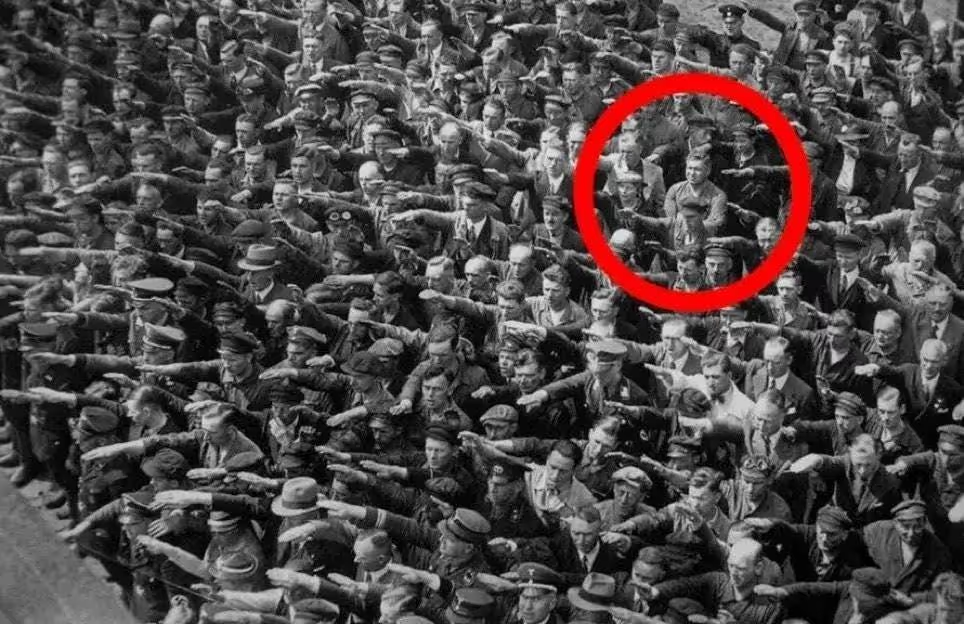
High agency thought experiment
You wake up here… In a 3rd world jail cell.

Your body is covered in two things: sweat with dirt in it, and dirt with sweat in it. An army of cockroaches scuttle the floor around you. Your mouth is drier than sandpaper.
You’re only allowed to call one person you know: Who do you call to try and get you out of there?
Why did you choose this person? What is it about them that made you pick up the phone?
This person you picked has something. A spark. A je ne sais quoi. A quality difficult to describe with words — but you know it when you see it. They are dogs you would not want to bet against – even when you’re trapped in a 3rd world jail cell. That ‘something' is high agency.
The 3rd world prison thought experiment helps identify the most high agency person you know because it represents the ultimate live problem — on steroids. You are giving them a seemingly impossible problem alone in the real world with no guidebook — and you’re still betting on them going against the crowd and finding a solution. Breaking someone out of a 3rd world jail is the final boss of doing hard things. It’s the Mount Everest of creating a way. It’s the Mecca of making shit happen.
The High Agency Spectrum
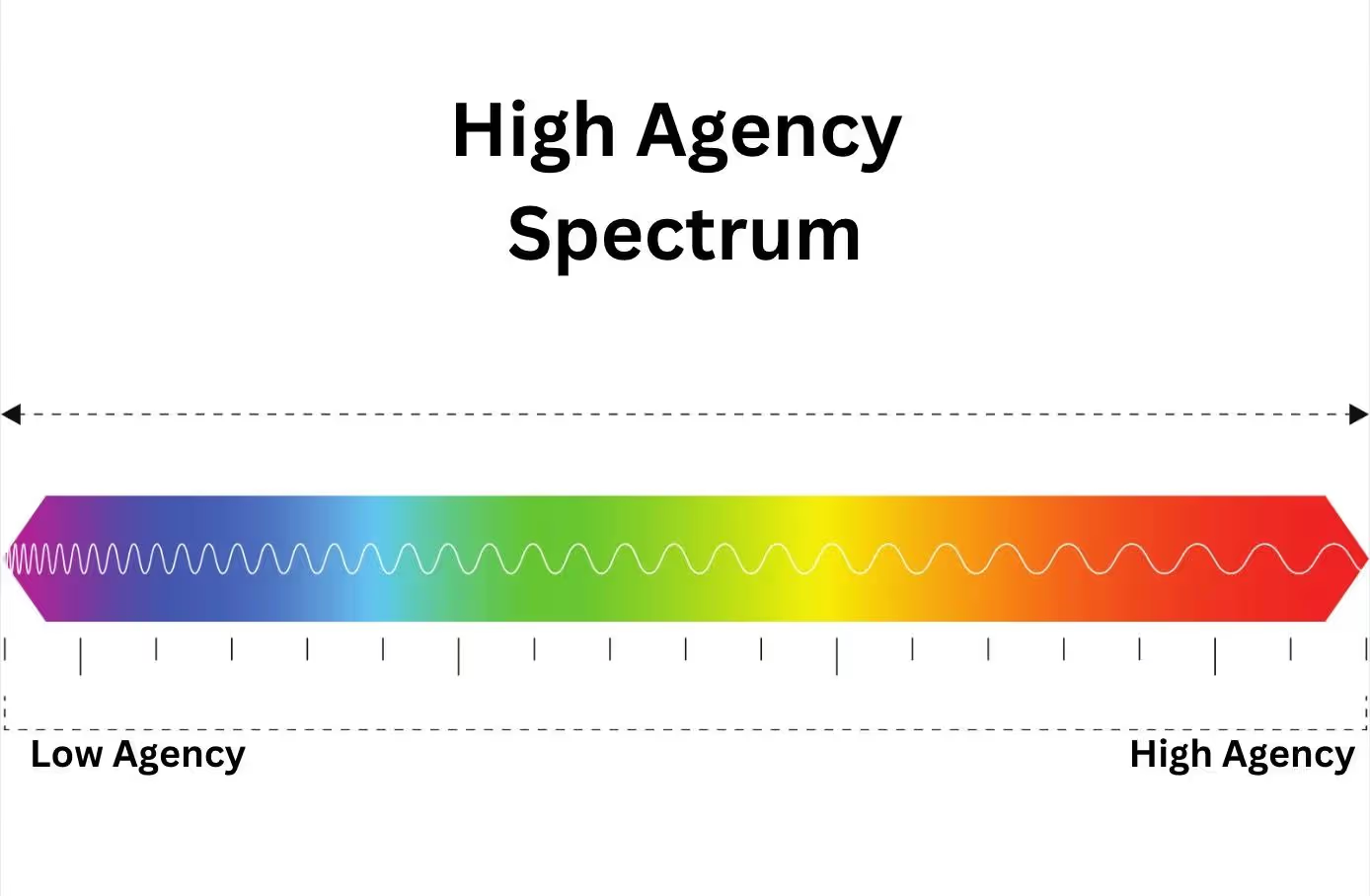
Imagine if you created two rooms:
Room A - People you’d be first to pick up the phone to when stuck in a 3rd world jail cell
Room B - People you’d be last to pick up the phone to for help when stuck in a 3rd world jail cell
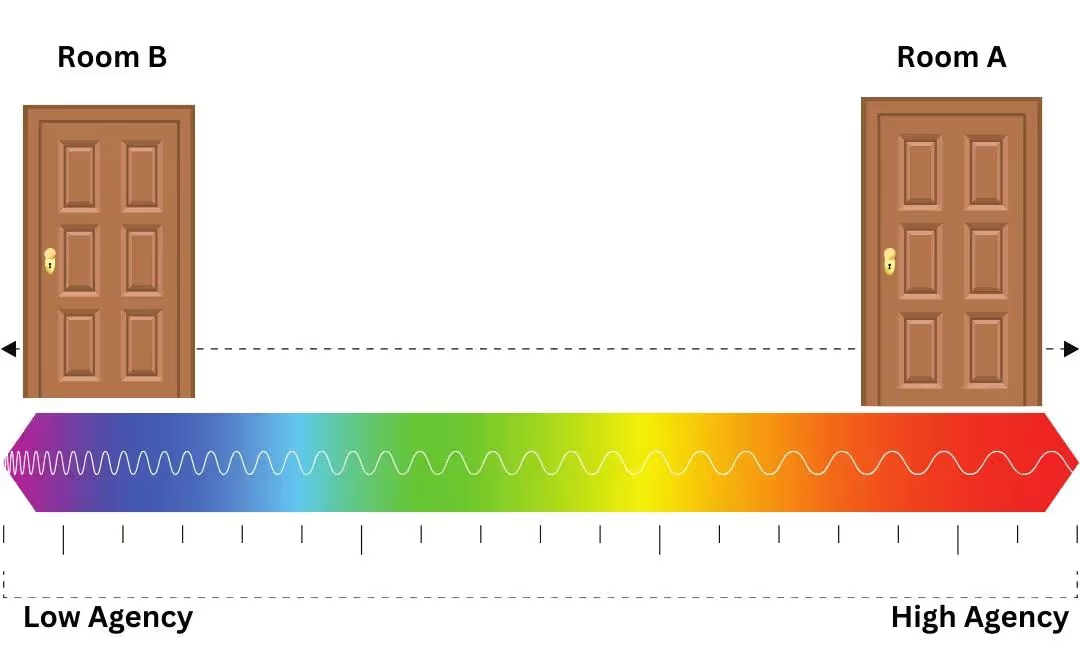
The untrained eye would struggle to spot the difference between people in Room B and Room A.
It's not age. It’s not gender. It’s not education. It’s not job title. It’s not politics. It’s not optimism. It’s not pessimism.The one big thing everyone in Room A has in common: They are happening to life. They don’t see reality as a static entity — but something to be shaped by human action.
The one big thing everyone in Room B has in common: Life is happening to them. They see reality as a static entity — and themselves as a passive participant.
The simplest definition of high agency: Are they happening to life? Or is life happening to them?
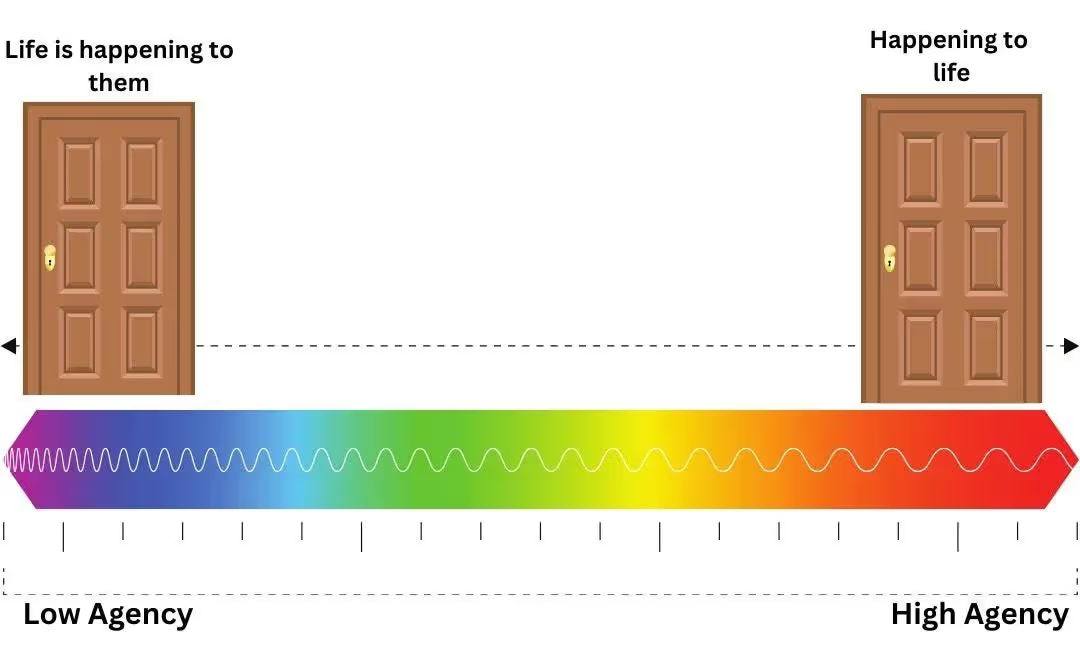
Optimism states the glass is half full.
Pessimism states the glass is half empty
High agency states you’re a tap. You look in the mirror and see a giant tap staring back at you.
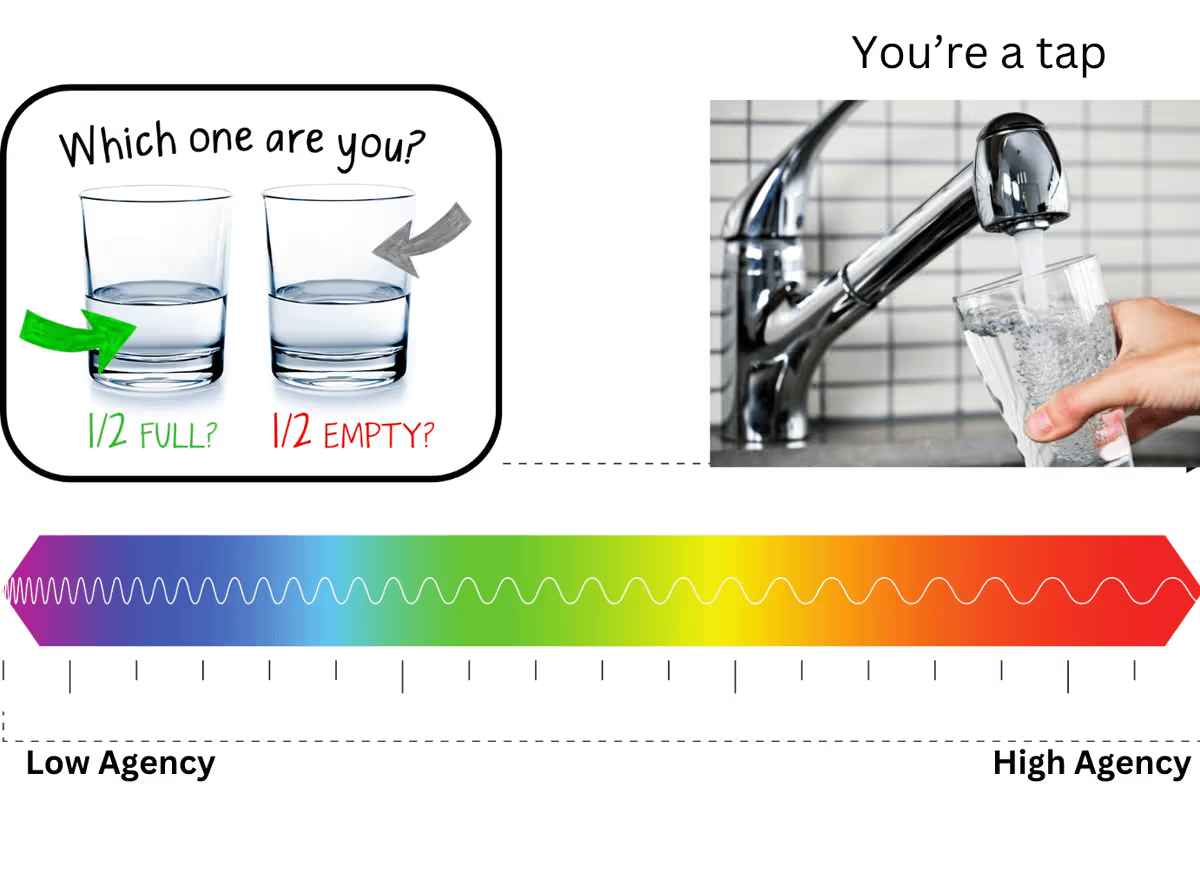
You might be wondering as I did: Would my friends call me when stuck in a 3rd world jail?
There’s bad news and there’s good news.
The bad news: Low agency is the default settings for most of us.
If you inspect your hardware and software, you can see the default settings:
1. Your hardware is your brain. It evolved for intense scarcity — not the abundance of the modern world. This hardware turns up in the 21st century with 2 primary objectives: Don’t die and fit in.
2. Your software is your worldview. The most critical software development years are the first two decades of your life. And for most, the following code is written by the education system:
You must attend. Your schedule is designed for you. Be quiet, sit still and listen to what the superiority figure has to say. Want to eat? Wait for the bell to ring. Want to visit the bathroom? Ask for permission. Ignore your curiosity, you must follow what’s on the curriculum. Embrace the mimetic hive mind of everyone the same age as you. Fit in and climb the social hierarchy. Want to be different? They’ll soon bully that out of you. Misbehave? Your free time is taken away from you. When you go home, you must do more set work. Last but not least, the most recent software update to most education systems: When you’re 18 years old, you’re encouraged to enter life-altering debt — before you understand concepts like interest rates or compound interest.
It’s not all doom and gloom. The good news: You have agency over your agency.
Moving up the high agency spectrum is possible — as countless historical examples show. The goal of this essay is to nudge you further up the high agency spectrum —towards the type of person a friend calls when stuck in a 3rd world jail cell. After all, if you can break someone out of a 3rd world jail, what problem can’t you solve?
Here’s what we will cover in as few words possible with the maximum amount of memes possible:
1. The most high agency person ever - The story of the most high agency person to ever live.
2. How to break out of low agency prisons - The 5 most common low agency prisons people find themselves stuck in: The vague prison, the midwit prison, the attachment prison, the rumination prison and the overwhelm prison.
3. Installing high agency software - 5 simple lines of high agency code: There’s no unsolvable problem, there’s no way, there’s no adults, there’s no memory of normal and there’s only now.
4. Agency over your agency - A list of practical techniques you can start using today to crank yourself up the high agency spectrum.
Ready to go down the high agency rabbit hole?
Let’s go.
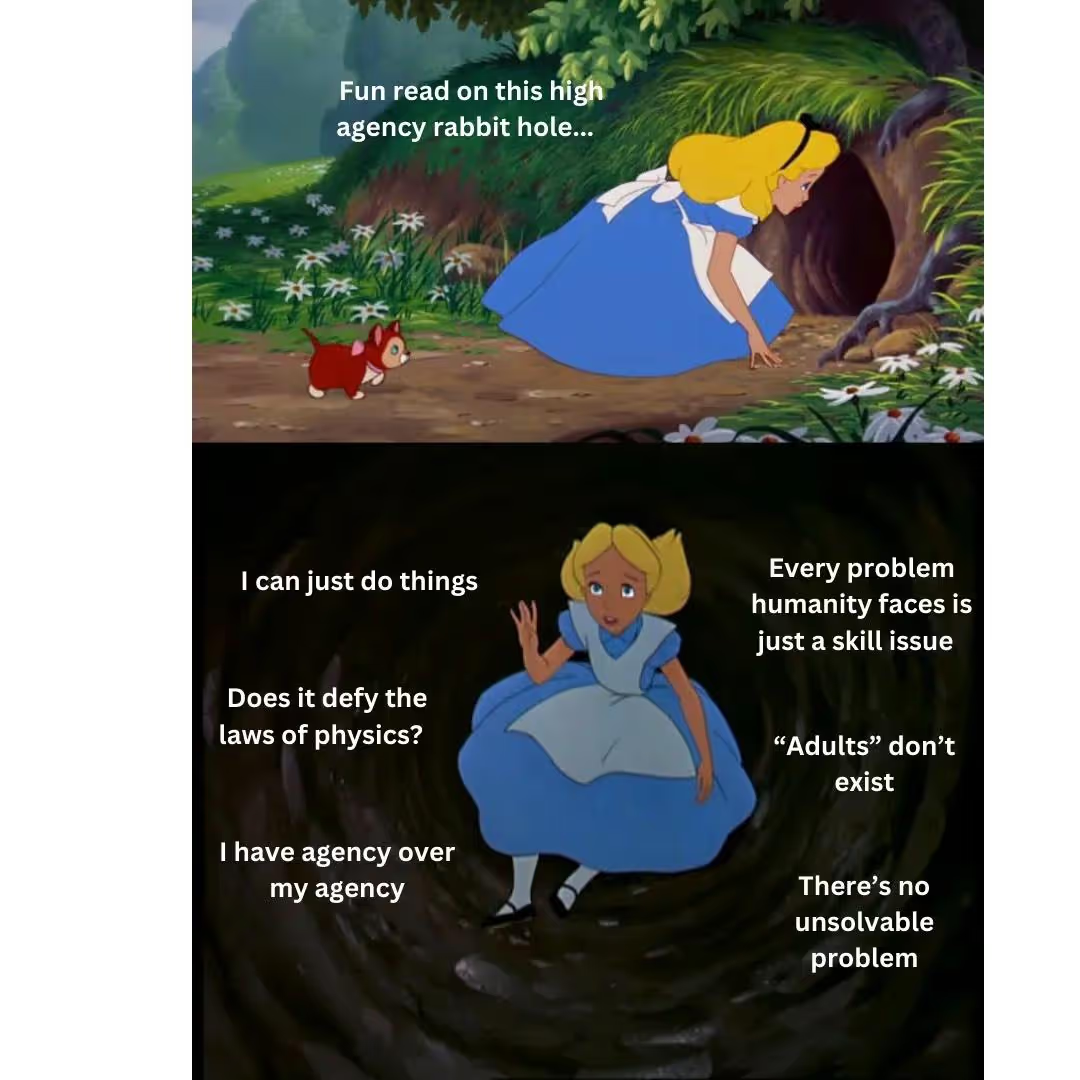
2. The Most High Agency Person Ever?
Upon hearing the idea of high agency, one response is:

Ouch.

To steelman the above argument and put it in the best light: He’s right. Life does happen – and it can be truly horrific. The list of problems in life is endless.
High agency doesn’t mean life doesn’t happen. Nor does it mean there are no problems. High agency is the opposite. It’s the process in which humans solve problems and shape life around them.
The more an individual happens to life as life is happening, the higher agency the individual has. The more a society happens to life as life is happening, the higher agency that society has. Life happening doesn’t deny that high agency people exist. The reason we need more high agency people happening to life to solve these problems. The bigger the problem is, the more agency is required.
Let’s update the spectrum to make it 3D:
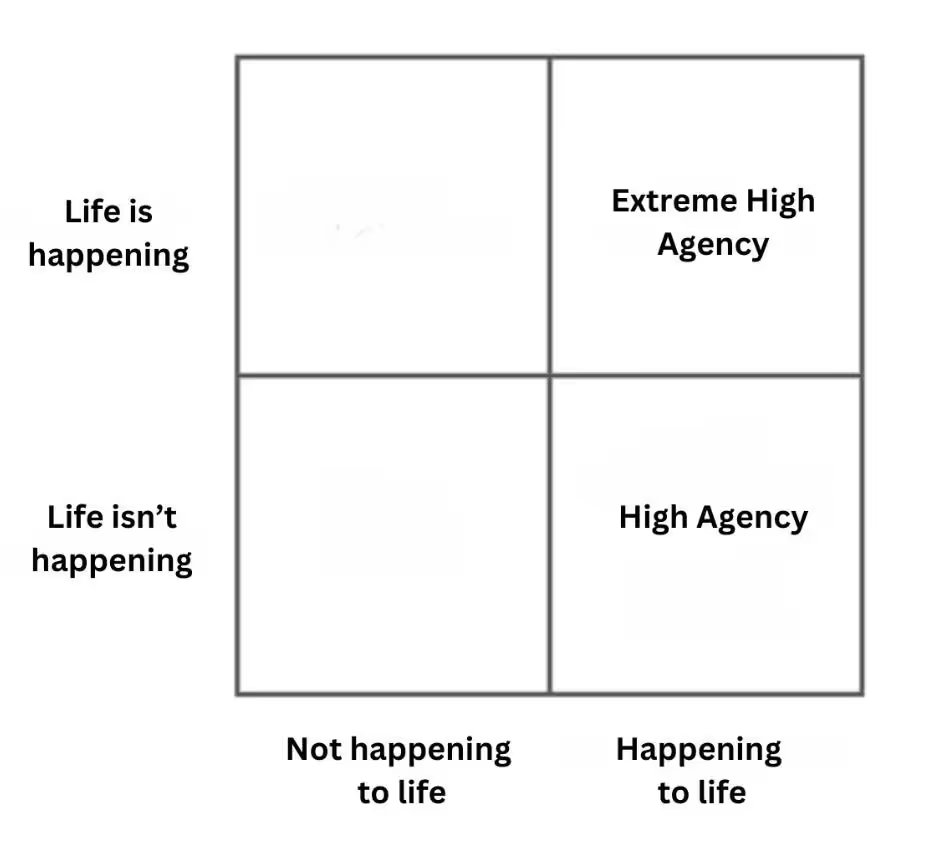
Meet Wilbur.

It’s 1885. He’s 18 years old, a well-behaved scholar and has a bright future ahead at Yale University. Wilbur grew up with loving parents and had a fantastic childhood. He wasn’t happening to life. Nor was life happening.
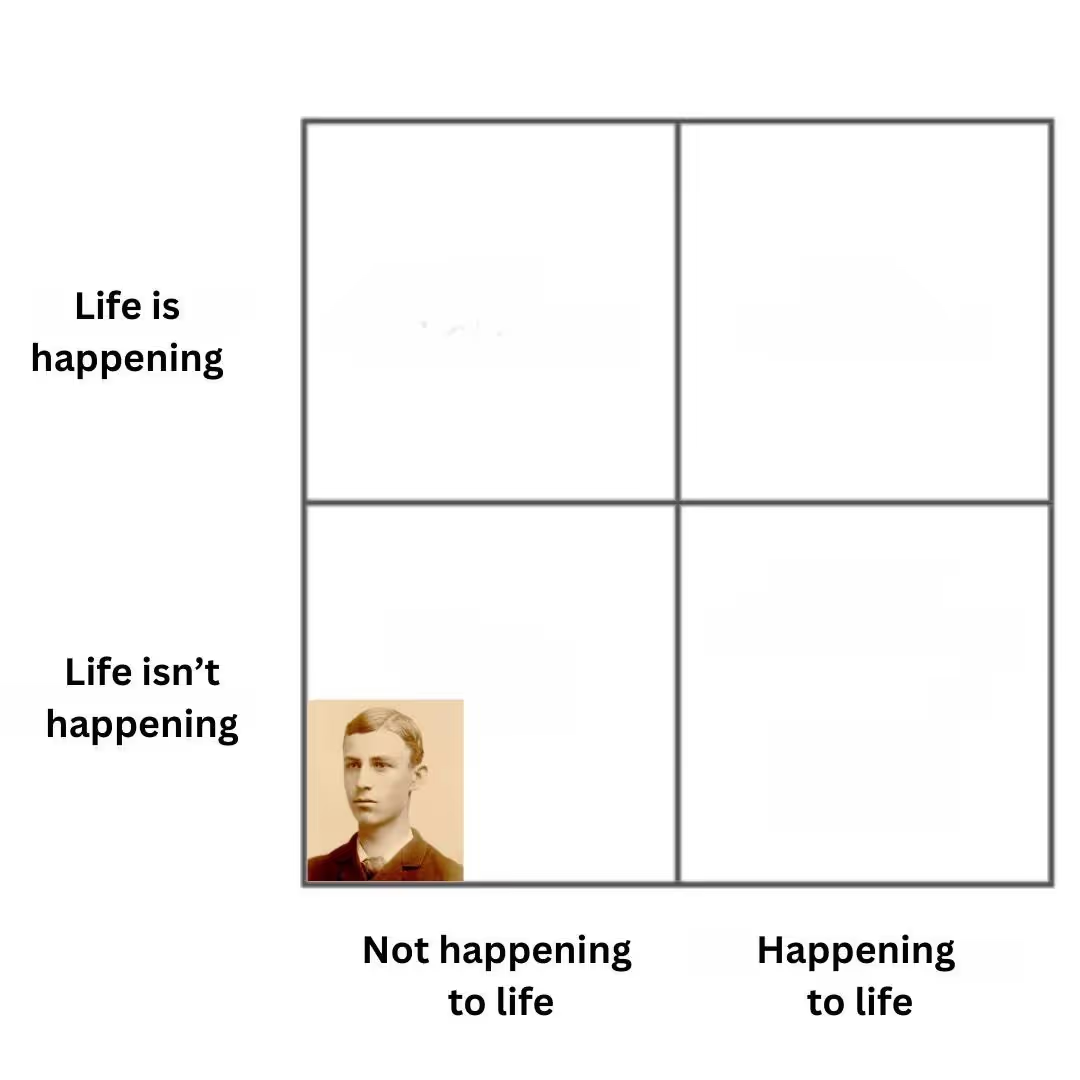
One day, Wilbur’s wonderful life got turned upside down. A local psychopath who was on a doctor’s prescription of cocaine - a common medical practice at the time -decided to do what psychopaths do: Smash Wilbur’s face in with a hockey stick.
As a result of the attack, Wilbur had to spend multiple years bedbound with nervous system problems, depression and heart palpitations. He had to abandon his dreams of attending Yale. He had his life (and face) permanently altered.
There’s no denying: Life was happening.
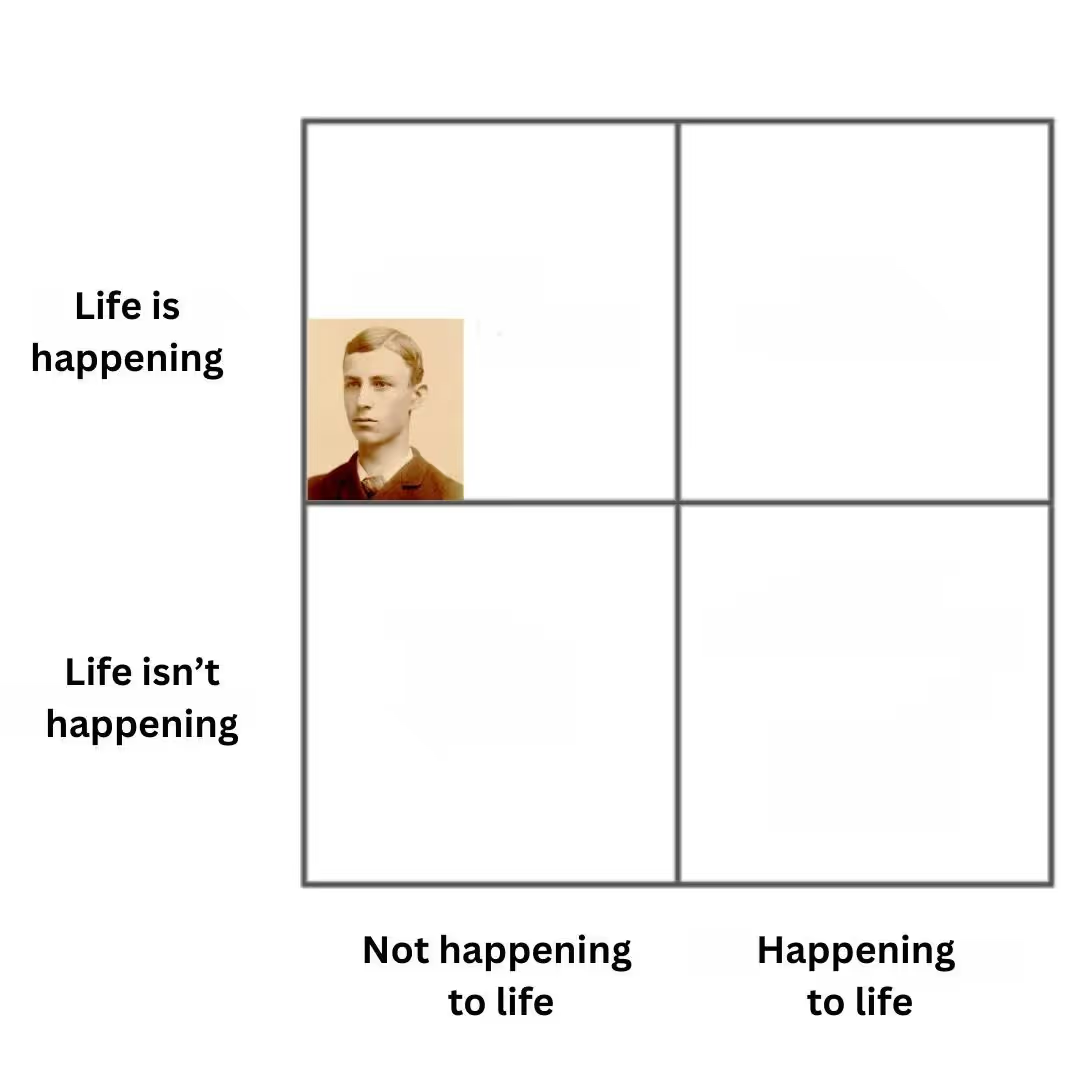
Oliver, the cocaine-rattled psychopath who smashed his face in didn’t come around and apologize — he instead became a serial killer, murdering his own family in the process.
To make matters worse, Wilbur’s mother was terminally ill and he was required to care for her. When he wasn’t bed-bound being cared for by his dying mother, he was returning the favour and caring for her.
Problems, problems everywhere. Life was seriously happening.
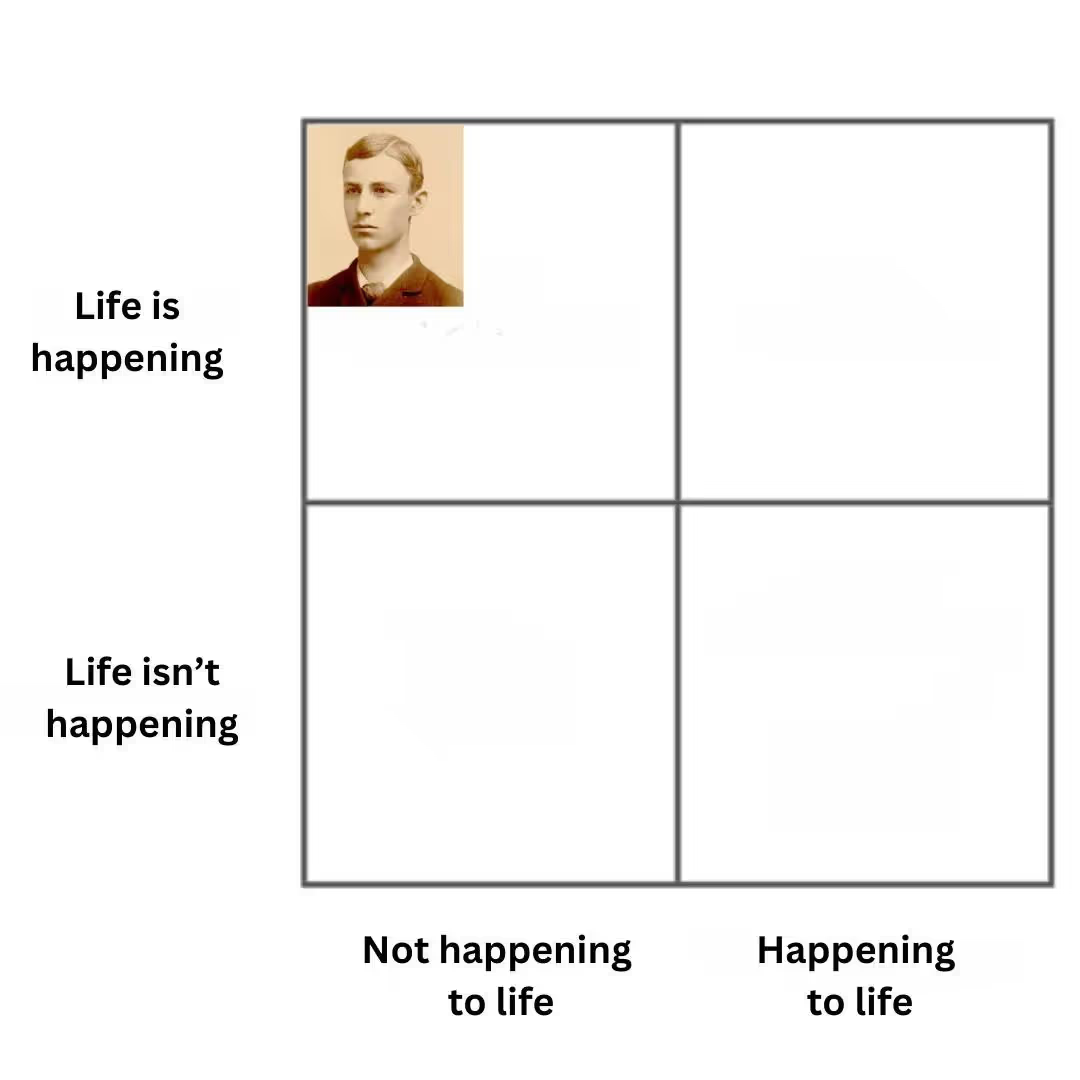
Wilbur concluded that:
1. Birds can fly
2. Therefore flying doesn’t defy the laws of physics
3. Therefore humans can fly.
4. Therefore Wilbur can fly
Wilbur believed the problem of flying was solvable — and he could solve it.
Try to delete your historian’s mindset and get into Wilbur’s present moment. At the time, flying was seen as an act for the mentally insane who had a death wish. The New York Times even published a headline: “Man won’t fly for a million years”. Flying was seen as an unsolvable problem. The cynics would point to the 0% success rate to date. Anyone who tried long enough — died.
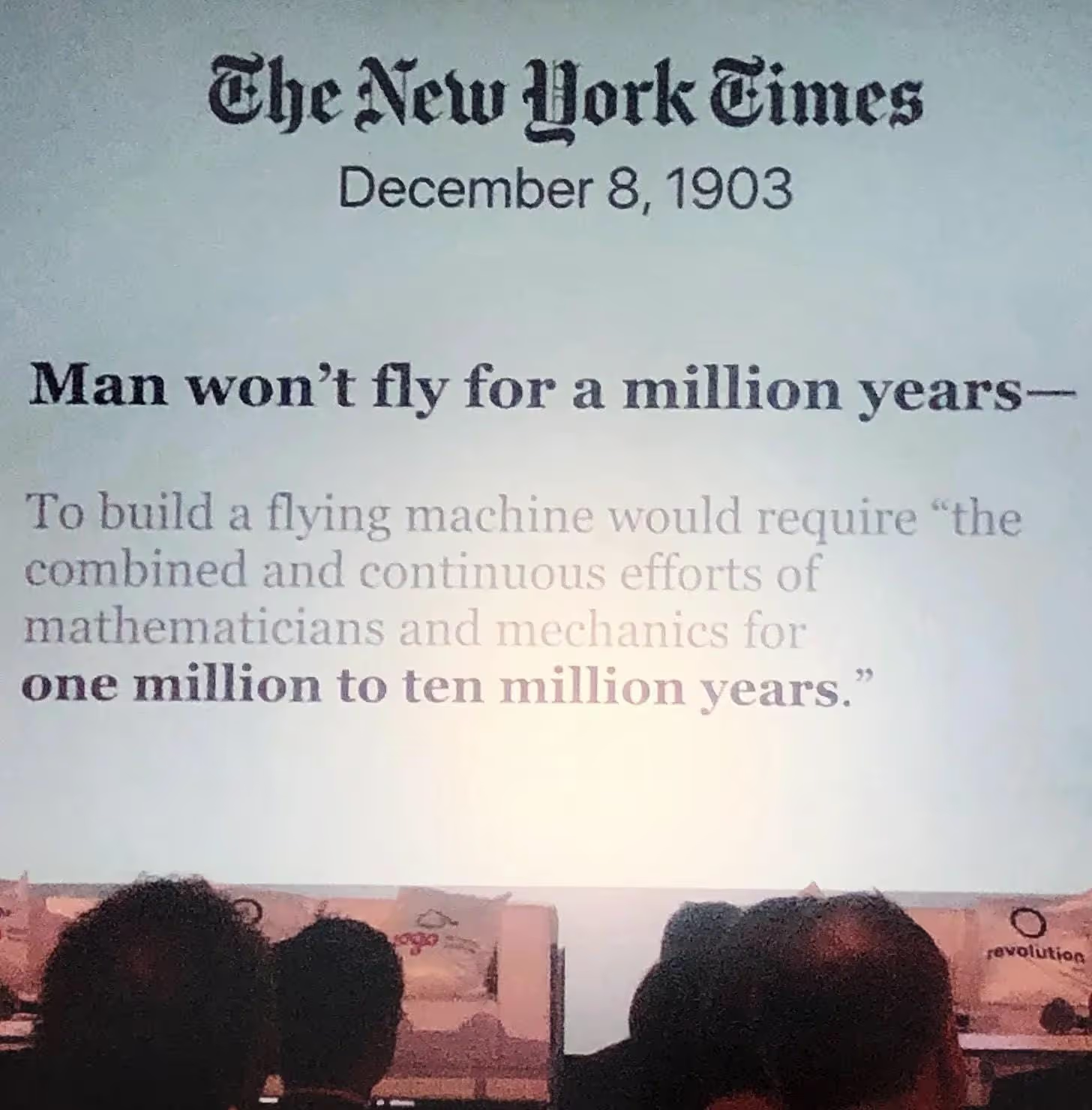
Wilbur shared this idea with his brother Orville. The Wright brothers worked from first principles and rejected the conventions of the time: If birds can fly, so can man.
Rather than live in hypothetical theory land, Wilbur and his brother had a bias for action: “Let’s start building full-sized gliders in our garage.”
Wilbur and Orville were crystal clear thinkers that reverse-engineered everything. The first bottleneck they needed to solve was the perfect environment for flying: They decided it was winds of 15 miles per hour and sand hills for a soft landing. Again — This is pre-internet. They couldn’t just Google Maps this location, so Wilbur got resourceful: He contacted the Weather Bureau of the United States and got access to all their data. Wilbur ran through the metrics of every location in the United States and concluded: Kitty Hawk, North Carolina.
Another problem: Kitty Hawk was 700 miles away from home — Wilbur and Orville had never left their hometown before. (They couldn’t catch an American Airlines flight just yet). Rather than ruminate on this, or let it defeat them — it was just another solvable problem: They just packed up the gliders and spent the next few days on the train to Kitty Hawk to live in a tent.
Look at Wilbur go!
Picture this. You’re a local farmer in Kitty Hawk called John. You’re on your usual walk around the fields with your dog and you see this sight:
Two brothers from a city far far away, living in a tent, spending their entire day pretending to be Seagulls. That’s right. Fully grown men from the other side of the country living in a tent — pretending to be birds for hours at a time.
https://x.com/i/status/1191022396968513536
The locals referred to the Wright Brothers as “a pair of poor nuts”. Wilbur and Orville ignored realised social conventions and strange looks didn’t mean man couldn’t fly, so they just carried on.
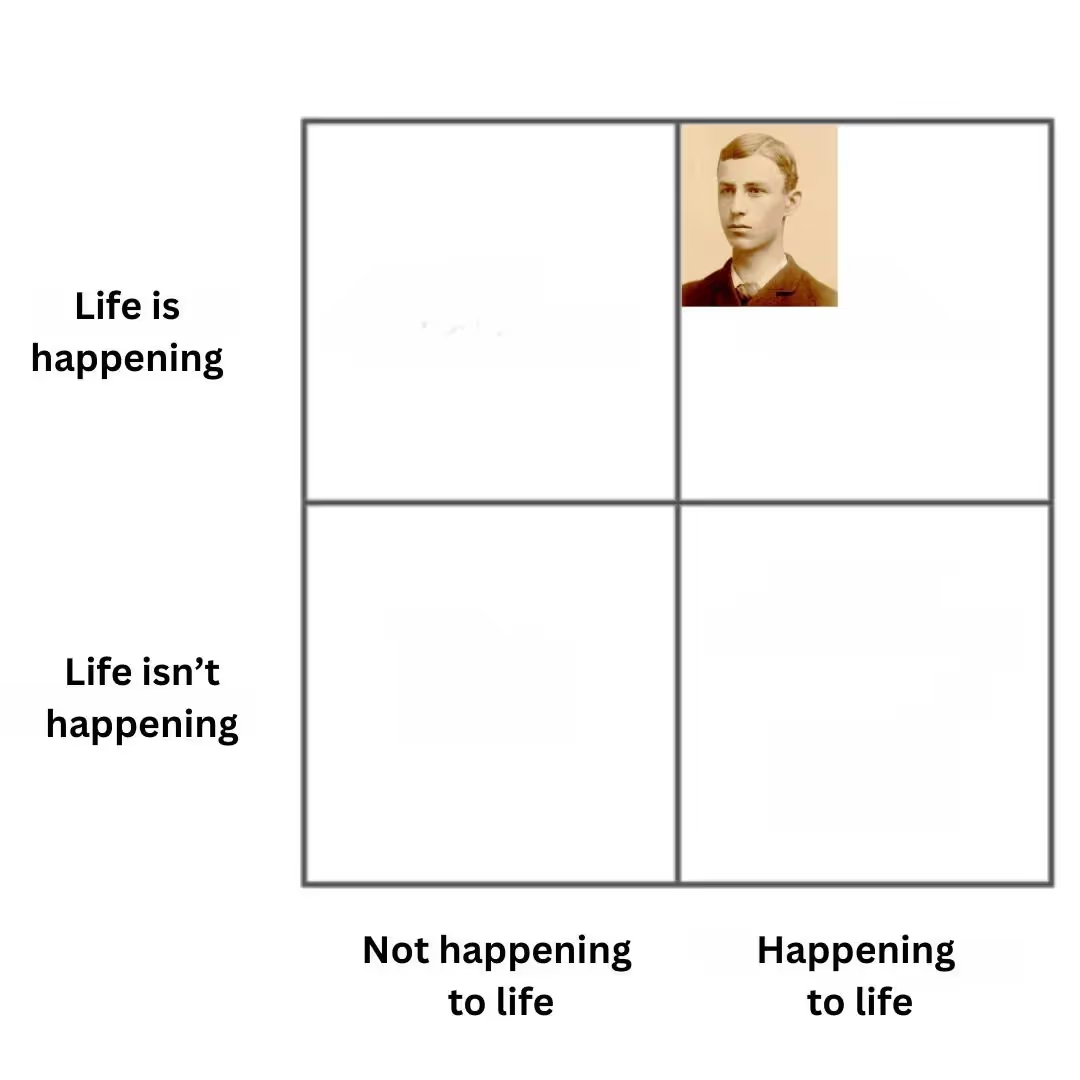
The Wright Brothers spent the next 4 years iterating through countless failures. Each time they would come up against a problem that was deemed impossible by other humans. But Wilbur and Orville knew the problem didn’t defy the laws of physics, the only bottleneck was knowledge of how to solve the problem and the bottleneck to solving the problem: High agency.
Solution 1 - Figured out how to balance planes by stealing a wing-warped system from birds (1901)

Solution 2 - After countless failures using the best aerodynamic knowledge at the time, they decided to question the knowledge and broke it down to first principles.They created a wind tunnel with a 6-foot box where they’d put 27 miles per hour wind through and test it with toy planes with 200 different wing shapes (see below). They rebuilt modern aerodynamic knowledge from their garage, with large amounts of The Wright Brothers’ knowledge still being used today.

Solution 3 - Made the first ever effective propeller.

Solution 4 - Solved the problem of heavy engines by building their own custom lightweight aluminum engine.

Make no mistake. It wasn’t easy. It was countless numbers of failures spread across years. Wilbur hit rock bottom one day. He looked across to Orville and said: “Not in a thousand years would man ever fly”
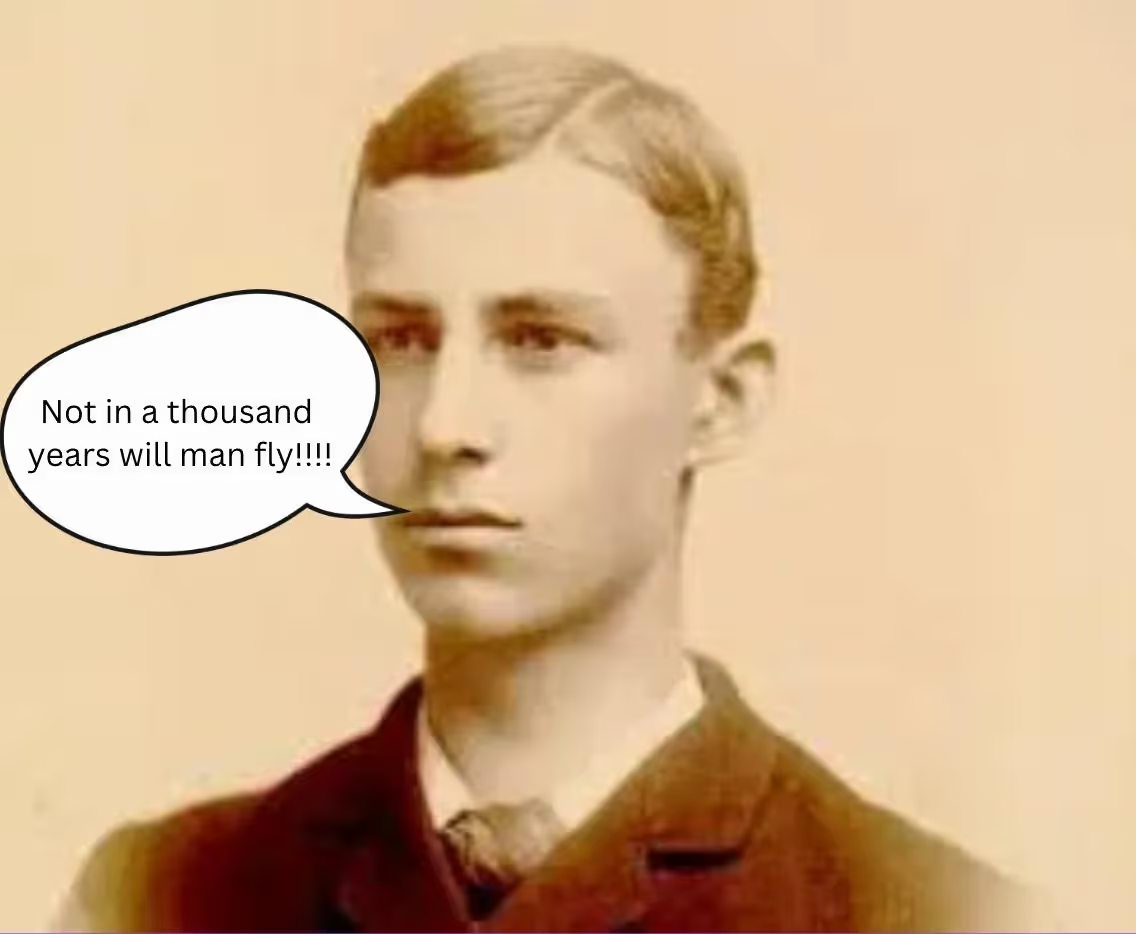
It was at that moment, he fell outside of the quadrant of life is happening. It was Level 11 out 10 of life’s difficulty settings.
And then on December 17, 1903… Wilbur and Orville were the first people to fly, with Wilbur’s flight being the longest that day: 59 seconds covering 582 feet.
Wilbur was so high agency he flew outside the quadrant of happening to life.
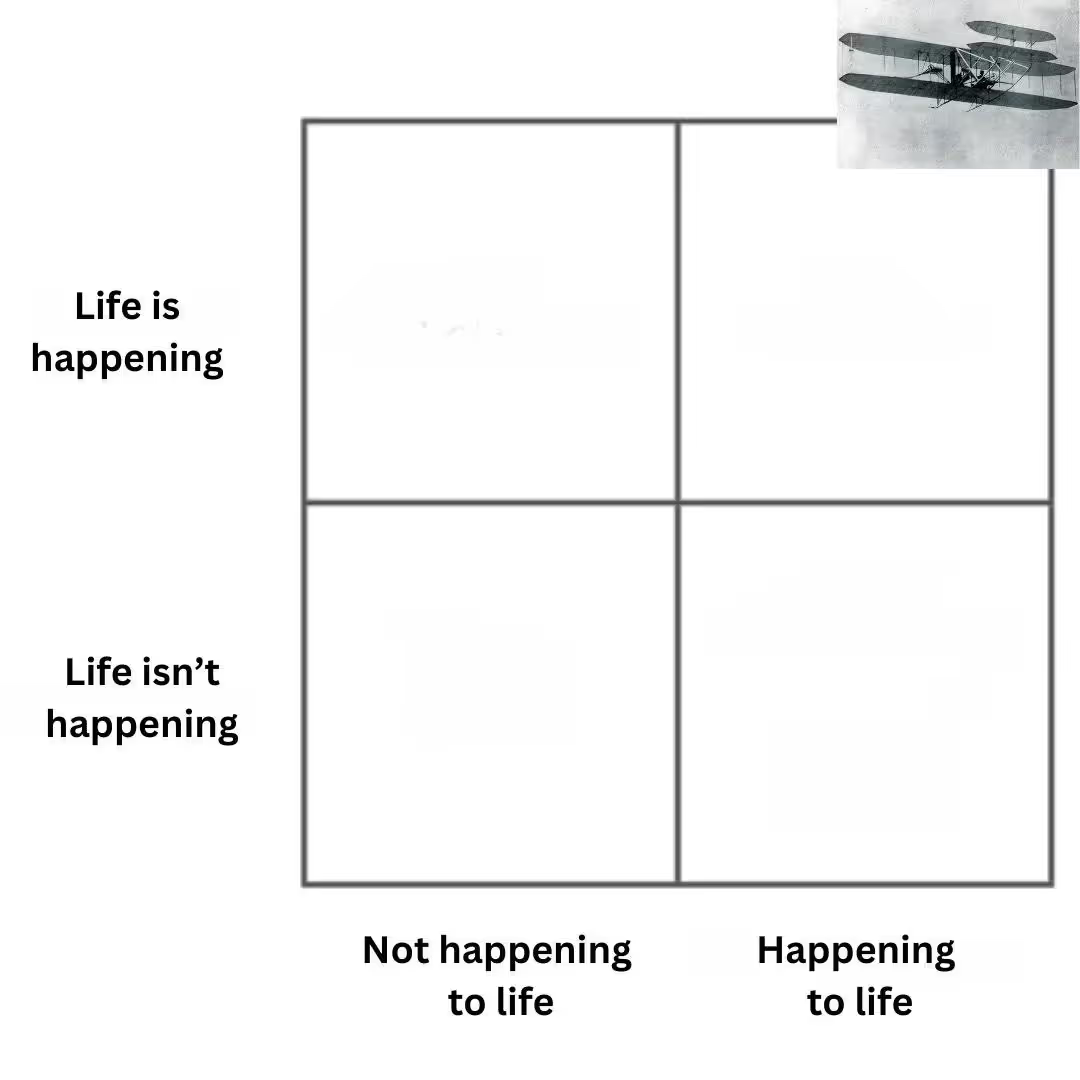
From his face smashed in by a local psychopath bed-bound caring for his dying mother — to creating and flying the first-ever airplane — just months after the New York Times headlines declared, “Man wouldn’t fly for over a million years”.
It’s hard to think of any human being that happened to life quite like the Wright brothers. They solved the ultimate live problem.
Last year, 5.58 billion seats were flown on airplanes — and it all started from “two nuts” pretending to be birds on a beach. The entire modern world is built on Wilbur Wright's high agency shoulders.
If you were stuck in a 3rd world jail, you’d call Wilbur.
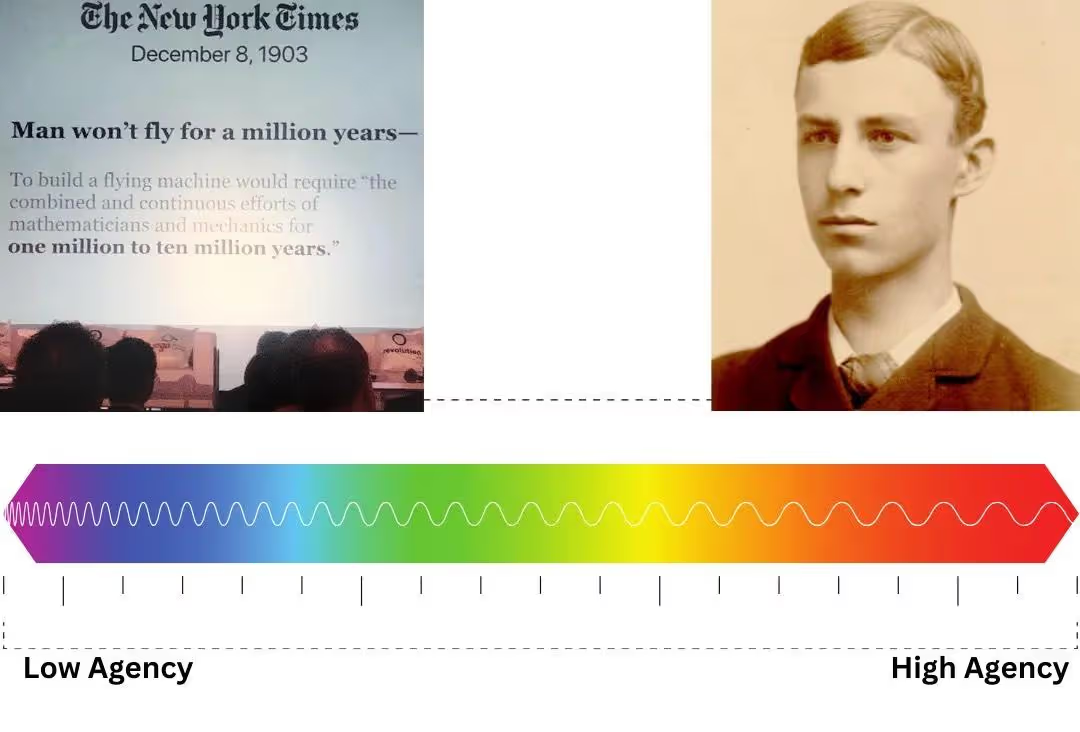
How do we get more Wilbur Wrights in the world and fewer New York Times?
We first must understand the root cause of low agency.
3. Breaking Out Of Low Agency Prisons
Low agency acts like a prison of the mind. But unlike a 3rd world prison, there are no physical guards or walls. It doesn’t even exist in physical reality. A person stuck in low agency is both the guard and the prisoner of the jail cell. The self-imposed prison exists purely in how your imagination frames reality. Low agency prisons only have power because they convince you their worldview is real.
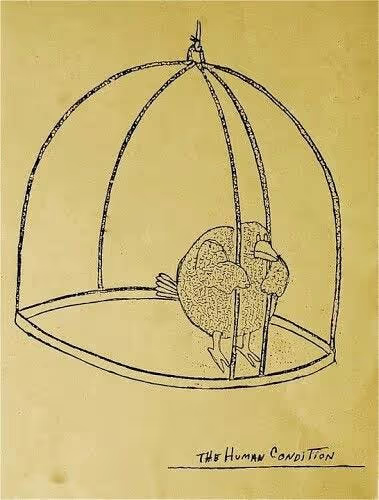
Low agency is being stuck on a problem for years that could’ve been solved with one Google search.
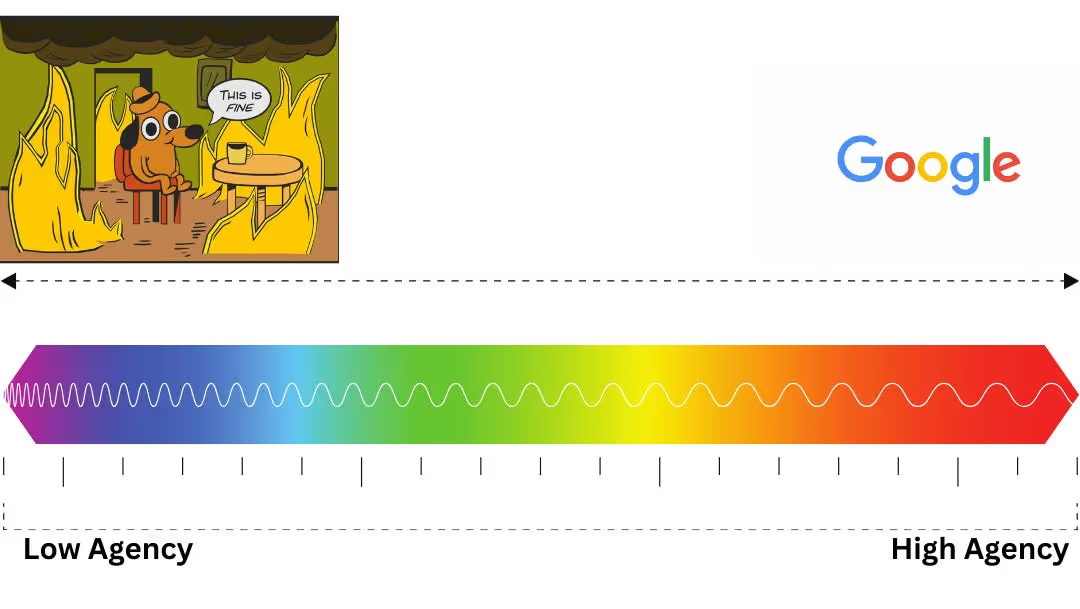
Low agency is sitting on dating apps waiting for the attractive brunette you see daily at the coffee shop to appear on the algorithm.
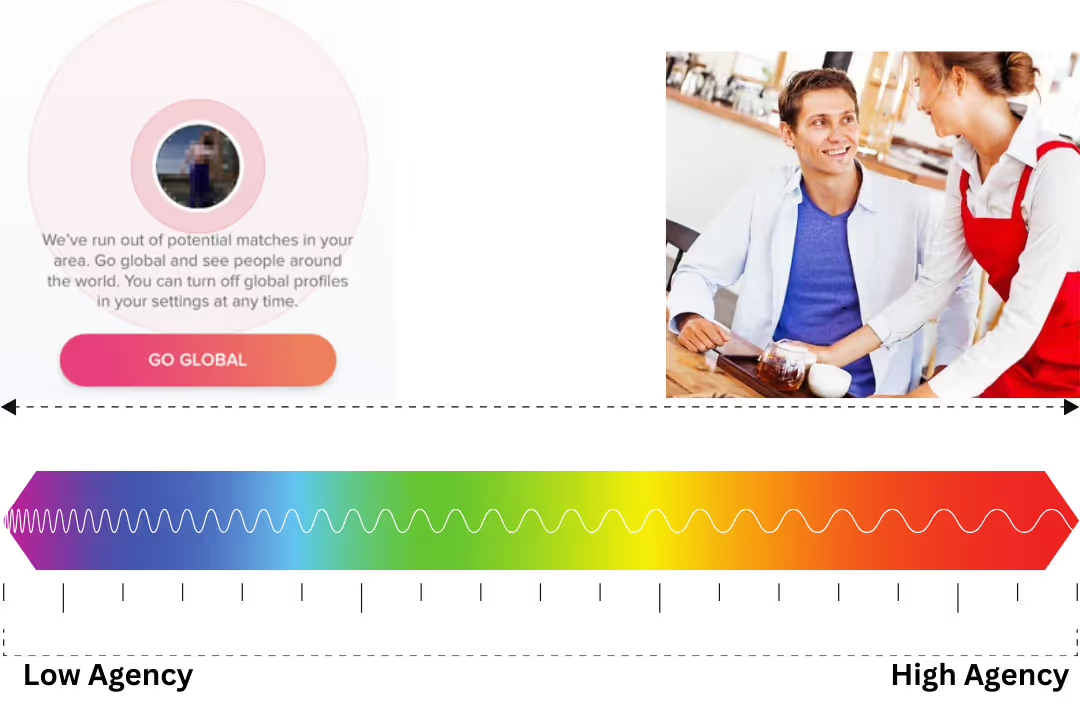
Low agency is drifting away from your friends because you were waiting for them to reach out.
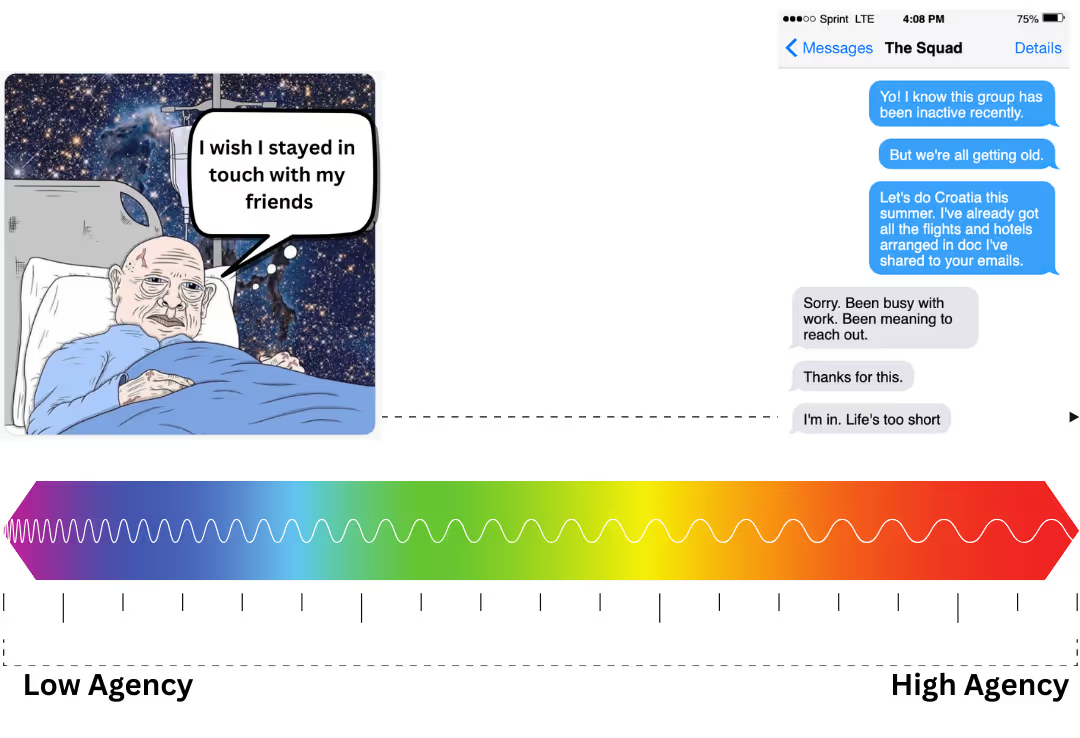
Agency is one of the most important ideas of the 21st century because it affects everything around you. We put a man on the moon before we put wheels on luggage. People carried their luggage — because nobody thought to question it or solve the problem.
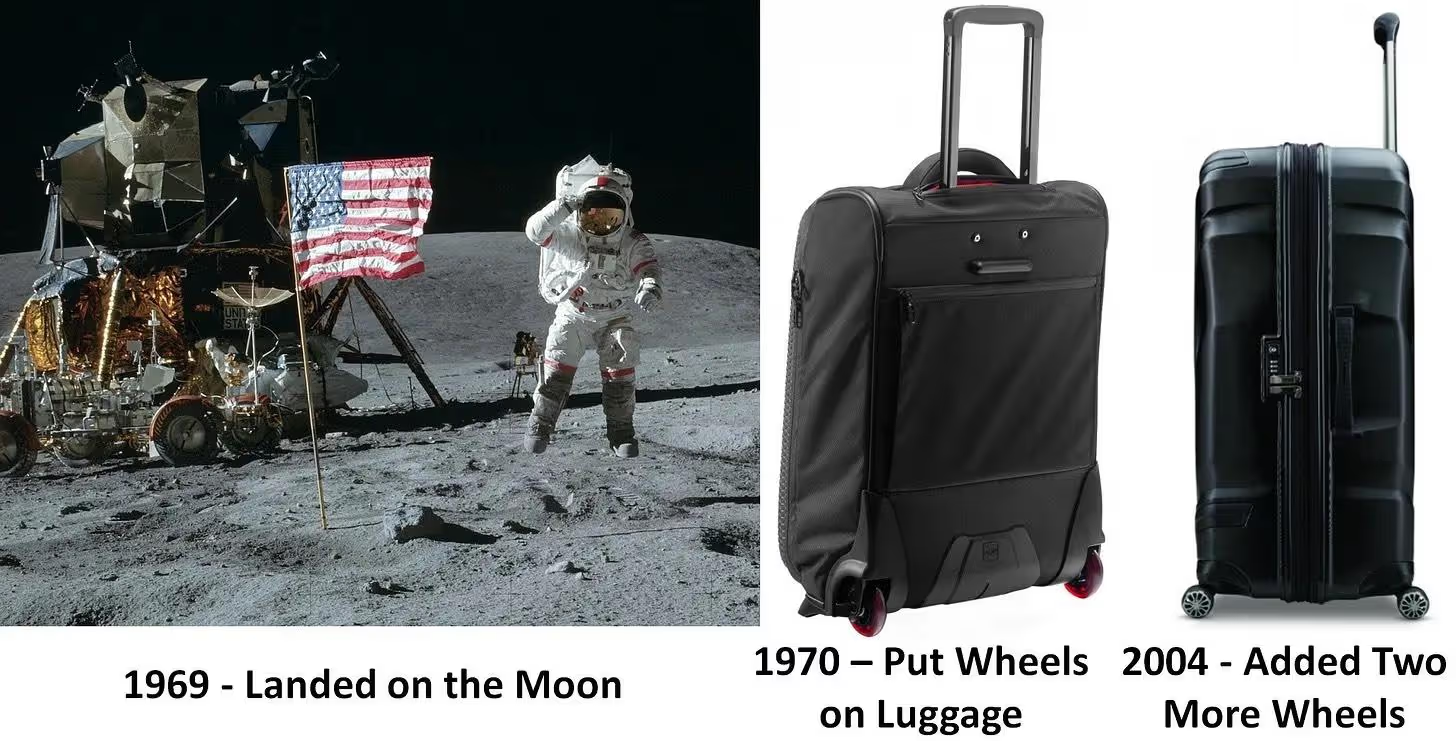
Countless low agency prisons can occur — below are the 5 most common ones — and how to escape out of them.
1. The vague prison
2. The midwit prison
3. The attachment prison
4. The rumination prison
5. The overwhelm prison
1. The Vague Prison
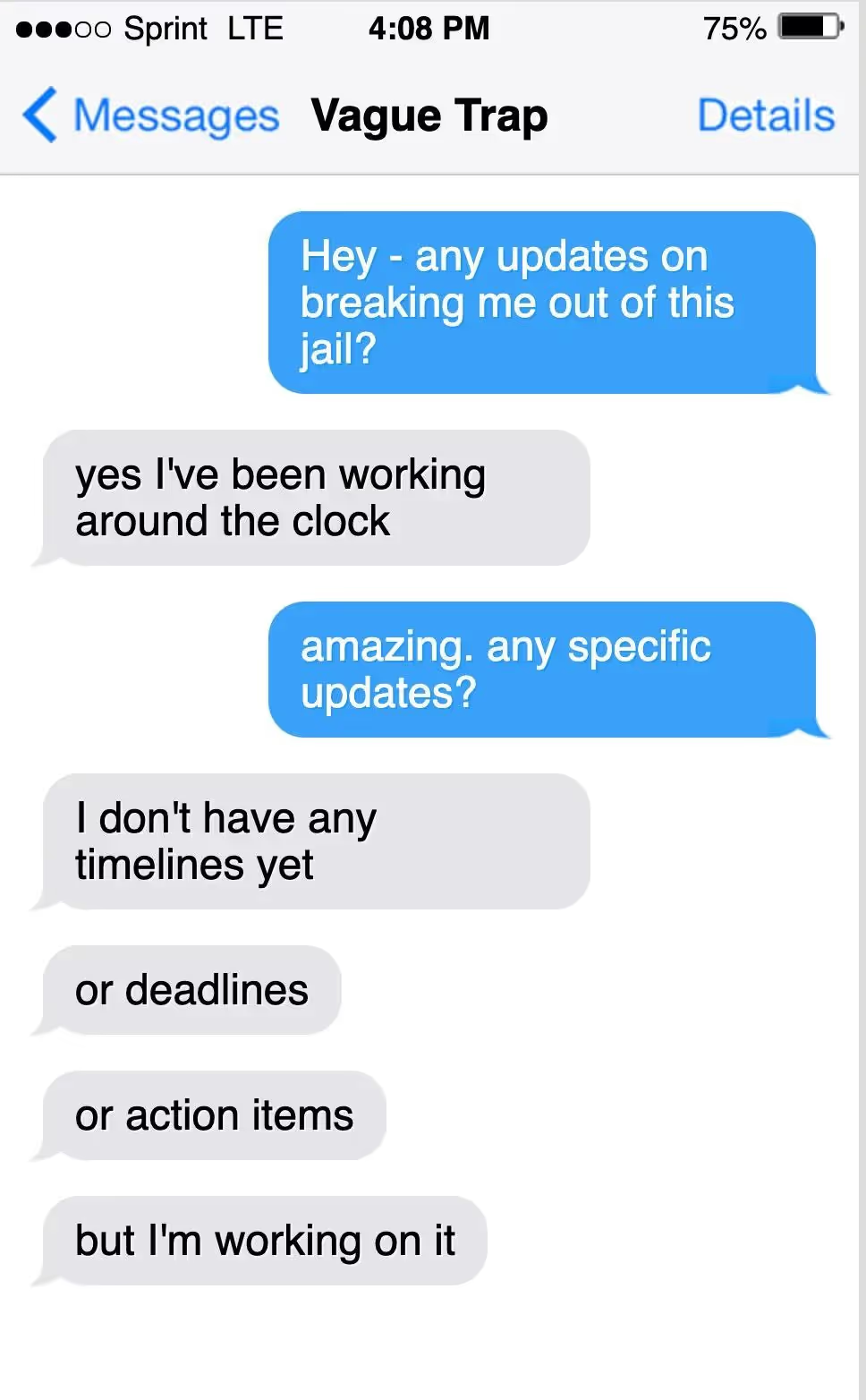
The vague prison hides from agency by never defining the problem, let alone a solution. It lives on vague statements, wooly language and muddy thinking.
The average person has 10-60,000 thoughts per day. Can you remember any specific thoughts from yesterday? Thoughts feel so real at the moment and then just disappear into the memory abyss. When you zoom in on those thoughts, what do they even look like? Most thoughts aren’t clear sentences. It’s a series of emotional GIFs, JPEg’s and prompts bouncing around consciousness like a random Tumblr page.
The vague prison is often downstream from vague questions:
Vague question: What career should I choose?
Specific question: What does my dream week look like hour by hour? What does my nightmare week look like hour by hour? What’s the gap between my current week and the dream/nightmare week?
”General ambition gives you anxiety. Specific ambition gives you direction”
The more specific and clear you are in defining the question you’re trying to solve, the easier it is to find specific solutions.
Breaking out of the vague prison: Have you tried clearly defining the problem?Most people keep problems hidden in vague fluffy thoughts. One tool that is useful in cranking up the specificity dial is to transform thoughts out of your head — and watch creative solutions commence: Write your thoughts on paper. Draw the problem on the whiteboard. Create a spreadsheet with the key numbers. Speak to a smart person about the problem. Move and think about the problem (Walk or run).
Each time you transform your thoughts, try to define problems and solutions in the most simple language possible.
The act of transforming from your head to another medium acts like a filtration system removing the vague mud from your thinking. The more you transform the problem out of low agency rumination, the clearer it gets.
2. The Midwit Prison
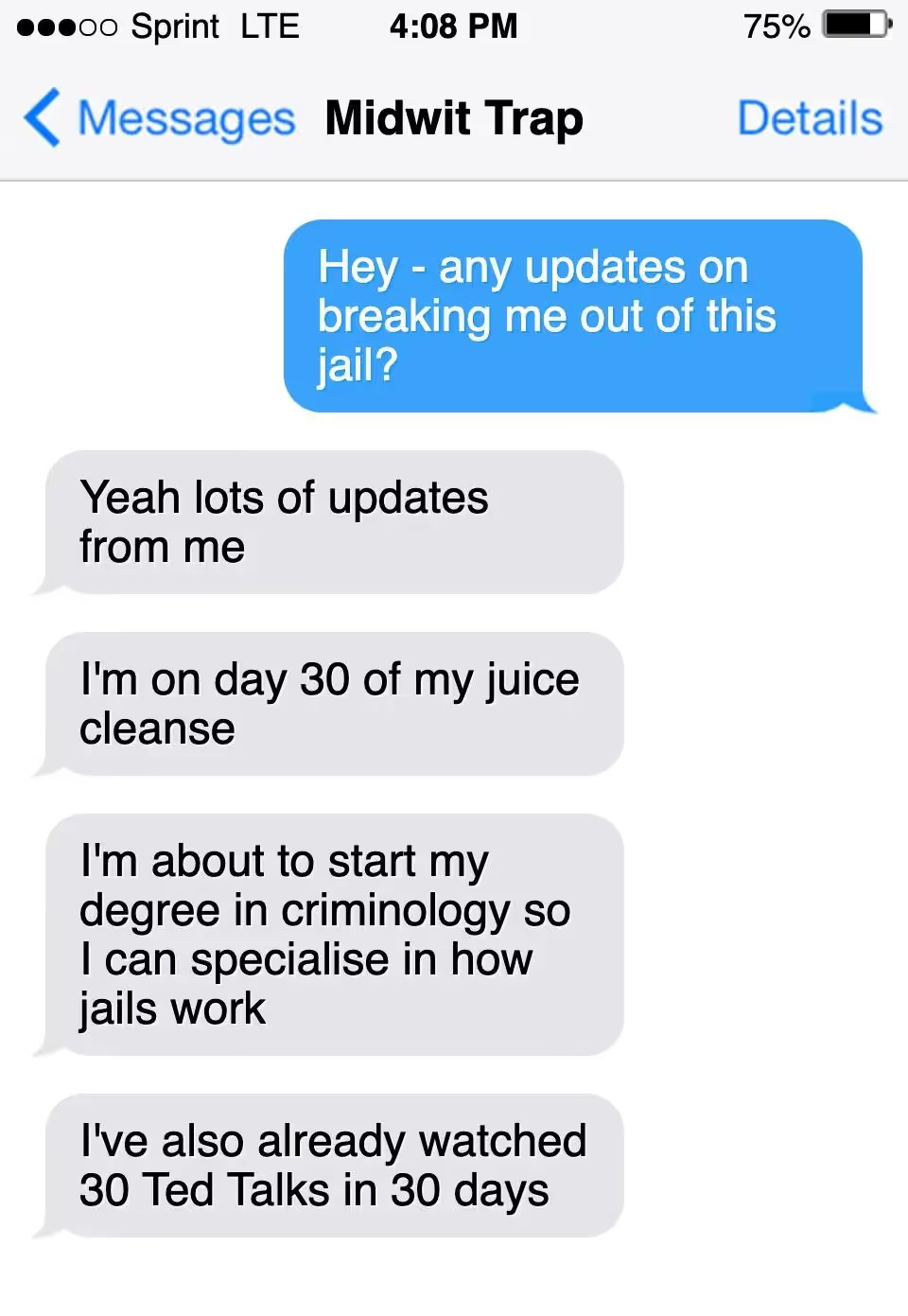
The midwit prison overcomplicates agency. It’s the curse of just enough intelligence to overcomplicate the actions required while not enough intelligence to simplify the complexity. It comes from the midwit meme: The dreaded midwit in the middle.
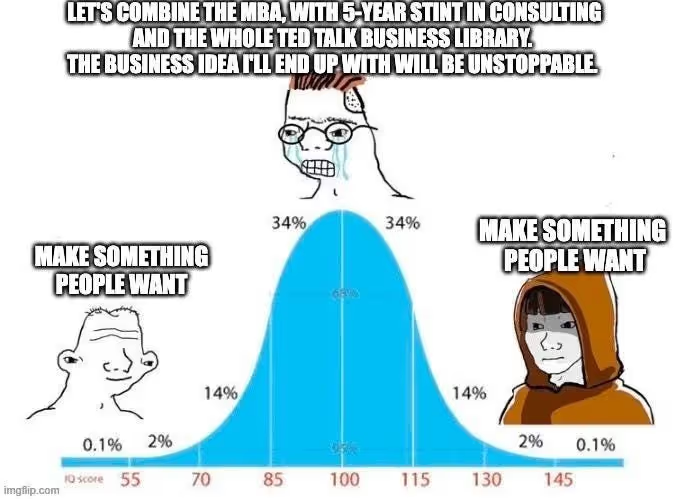
The guy on the left isn’t smart enough to overcomplicate the simple actions. The guy on the right is smart enough to avoid bullshit and re-focus on the simple actions. The midwit in the middle lives in the danger zone: He chases sexy mental masterbation over unsexy action, and mistakes simplicity for stupidity.
The less intelligent guy on the left often has more agency than the midwit because he didn’t have the cognitive horsepower to bullshit himself.
Escaping the Midwit Prison: What would the guy on the left do? Find it via inversion.Step 1 - Stop trying to be the guy on the right - The first step out of the midwit prison is to identify the root cause of the midwit prison: The desire to be the guy on the right.
Step 2 - Become the guy on the left - The next step is to focus on being the guy on the left. Find the simple ideas and take them seriously via inversion.
E.g. "I want to become a better writer”
The midwit will start learning about writers' coffee-drinking routines or researching the perfect keyboard to enhance their word count. Instead, how would you ensure you become a worse writer?
1. Do not write
2. Write inconsistently
3. Write about things you find boring
Flip them around and you've found the simple ideas the guy on the left will come up with:
1. Write
2. Write consistently
3. Write about things that excite you
Do not move onto any complex solutions until you've maxed out your agency on those 3 things. Take the simple ideas as seriously as possible.
3. The Attachment Prison

The attachment prison can’t see high agency because it’s too attached to its low agency frame of reality. It’s being so zoomed in with your past ideas you can’t see any other way of looking at things. You become the man with a hammer who can only sees nails.
The 3 most powerful mind-altering drugs: DMT, meth, and momentum.
The root cause of the attachment prison is last principles thinking. This is the evil brother of first principles thinking. Your mind comes up with an assumption and then looks for evidence to support it. The evil genius of the attachment prison is it never gets you to question the assumption or even notice it.
Escaping the attachment prison: What would I do if I had 10x the agency?This question throws a first principles grenade into your mind and forces you to start the problem again from a fresh perspective. It gets you to detach from your assumptions and build a perspective from a blank canvas. You realise the problem wasn’t the real problem, it was simply the assumptions you had.
https://x.com/nickcammarata/status/1876749765951562209
4. The Rumination Prison

The rumination prison freezes agency. It’s the inability to act due to fear of making the wrong decision. It’s spending years of your life peeling the never-ending what-if worry onion.
A person stuck in the rumination prison lives on a permanent loading screen. Nothing happened except endless spirals of thought. It’s spending your entire life scrolling the metaphorical Netflix homescreen unable to find the perfect film. The ruminating perfectionist keeps kicking cans down the road because they can’t find a perfect option with zero perceived risk — only to end up with lots of cans and no more road to kick them down.
The ruminating prison involves endless worry loops that sounds like this: ”I’ve spent the last 5 years thinking about leaving my hometown of Doncaster and going to New York — but there’s no perfect option. When my mind thinks of going to New York, it plays a horror film of the expensive rent draining my bank account and me losing contact with my home friends. When my mind thinks of staying in Doncaster, it plays a horror film of me as an old man wondering what could’ve been if I moved to New York.” — When faced with those horror films, they opt for more thinking time. In the 5 years spent ruminating on the theoretical decision to move from Doncaster to New York, they could’ve collected practical data on New York, Los Angeles, Rio De Janeiro, Tokyo, Sydney, London and Reykjavík. The overthinker tries to think away all risk — and ultimately remains frozen.
Escaping the rumination prison: How can I turn this into an experiment?
Reframe decisions as experiments. You’re no longer a perfectionist frozen on stage with everyone watching your every move, you’re a curious scientist in a lab trying to test a hypothesis. E.g. “I’m 60% certain that moving to New York is better than 40% of staying in Doncaster…Ok. It’s time to Blitzkrieg.” Book the tickets to New York and run the experiment. Success isn’t whether your forecast is correct and New York is perfect, it’s that you tested the hypothesis.
5. The Overwhelm Prison
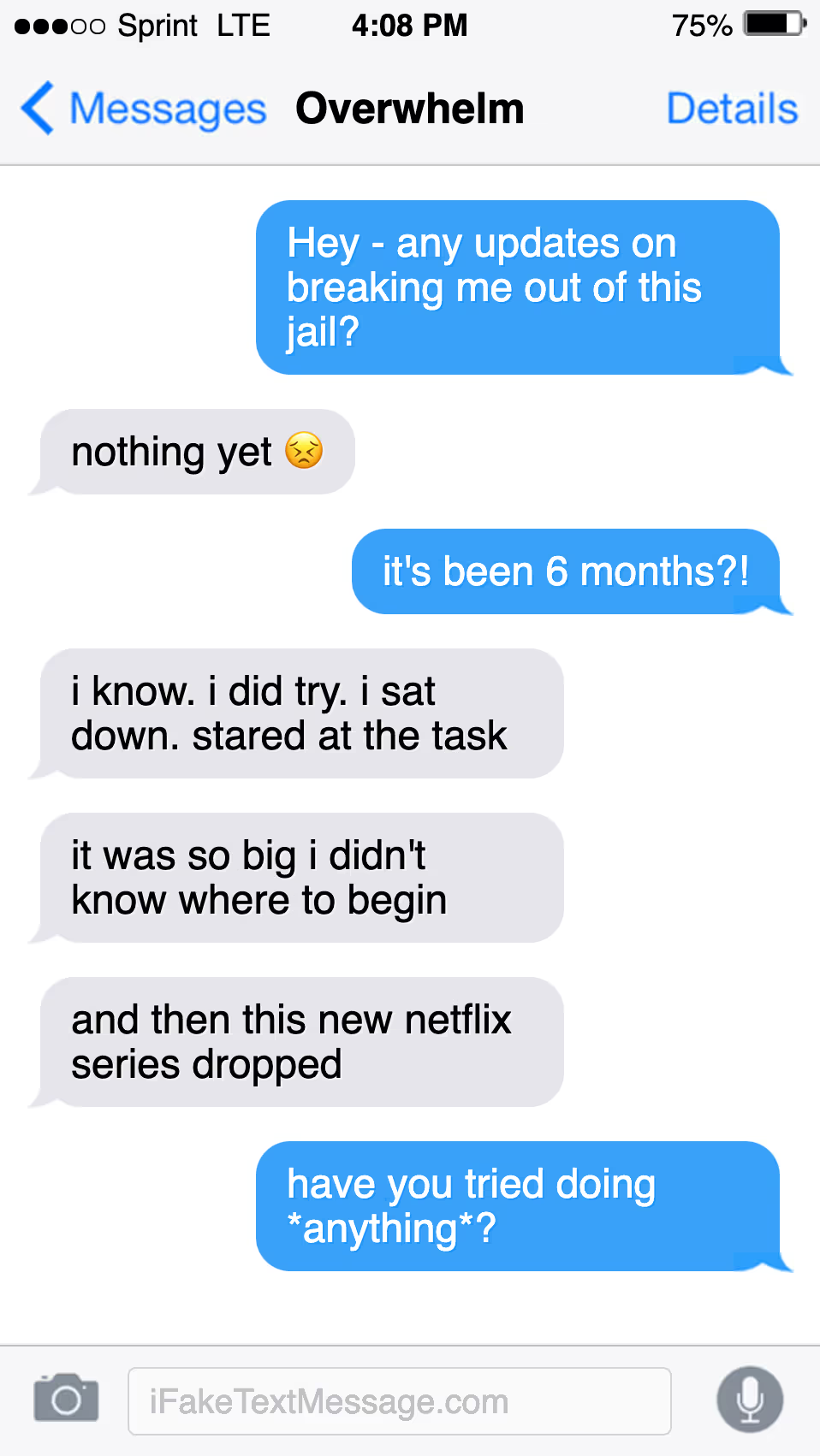
The overwhelm prison paralyses agency. The task is so daunting you don’t know where to begin. You drown in the sheer potential number of actions ahead of you.
Learn quantum mechanics? Where do I even begin?
Build a supersonic jet company? Where do I even begin?
Black belt in Brazilian Jiu Jitsu? Where do I even begin?
The overwhelm prison turns the problem into a badly designed video game. It looks at where you are now — level 0 — and contrasts that with the ideal — level 1000 — feels overwhelmed and runs away. It creates a perception of agency as a mountain and you as an ant.
A good rule of thumb: Video game designers know more about human psychology than 99% of psychologists.

Video games break us out of the overwhelm prison by chunking everything down into small enough chunks to create momentum — Level 1, Level 2, Level 3 etc. Each step is small enough to not be overwhelming, but big enough to be addicted to the progress.
Escaping the overwhelm prison: What’s the smallest first step imaginable?
If you’re going to eat 100 foot sandwich, you’re going to do it one bite at a time. What is the smallest first bite you can do? What is level 1 of the video game?
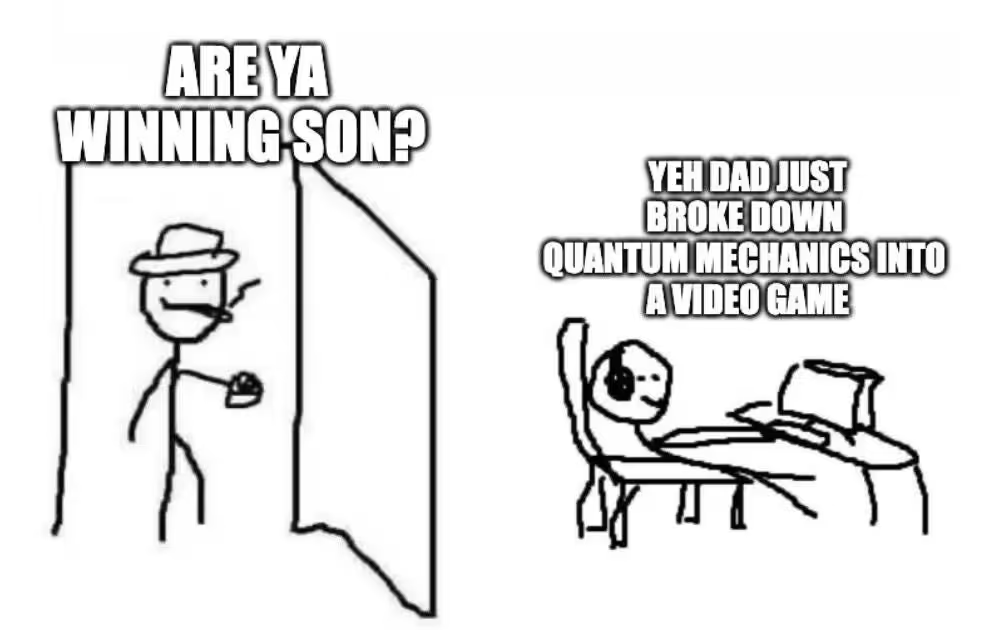
E.g. Teaching yourself Quantum Mechanics
Level 1 - Write down everything I could possibly do to start learning quantum mechanics
Level 2 - Use notes from level 1 to create the next 8 levels
Level 3 - Search “Quantum Mechanics” on Amazon and buy the top 5 rated books.
Level 4 - Read the first 10 pages of the first book.
Level 5 - Put anything I don’t understand into Chat-GPT and get it to explain it to me like I’m a smart 12 year old
Etc
The beauty of the video game design is that level 1 is always an easy enough action to do and it moves you forward. Level 2 builds out the rest of the video game. And boom, you’re already on level 3. Snort in that dopamine and watch the overwhelm fade away.You’ve now escaped all the low agency prisons.
Ready to start installing high agency software in your head?
4. High Agency Software
High agency people are extremely different to one another. They are individuals. But they tend to have some similar software if you look deep enough. Some are conscious of this software, others are completely subconscious.
Here’s 5 simple lines of codes that I’ve seen most high agency people share:
1. There’s no unsolvable problem
2. There’s no “adults”
3. There’s no way
4. There’s no memory of normal
5. There’s only now
1. There’s no unsolvable problem
The human brain is a question-answering machine. If you ask it: “What is good in my life?” — it will find answers. If you ask it: “What is bad in my life?” — it will find answers.
When faced with a problem, if you ask it, “Does this defy the laws of physics?” — it will reply with “No” — and start creating all the ludicrous ways this could be possible.
“Does this defy the laws of physics?” forces you to wipe your mental whiteboard around the problem and start from first principles. This question sounds absurd, but it helps act as a repellent to passively accepting what other people have said. It knocks on the door of your sleeping imagination. If your problem doesn’t defy the laws of physics, it’s theoretically possible. If the bouncer on the front door says you can’t get in - a low agency trap to fall into is to accept this social statement as reality. Instead ask: “In order to get into the venue — do you need to defy the laws of thermodynamics? Or break Newtons laws of motion?”
The bouncer may have said you can’t get in tonight — but it doesn’t defy the laws of physics — there’s lots of ways you could still get in. You could bribe the bouncer, get in through the back door, contact the owner of the venue, disguise yourself in a new outfit, get your friends to bring a full camera studio and pretend it’s TMZ capturing the club denying entry to an A-list celebrity.
Golden rule: You can’t give fixed odds on a human solving a problem - How humans interact with the problem increases or decreases the chance of the problem being solved. David Deutsch uses the example of an asteroid about to hit Earth 1 year from now. You could give fixed odds based off the physics of the asteroid of what would happen to Earth if penguins were in charge. With human beings, you can’t give fixed odds due to human agency. If they choose the low agency route of passively accepting the earth will be wiped out, the odds of annihilation increases. If they choose the high agency route of creating laser beams that blow the asteroids out of the sky, the probability of annihilation decreases.
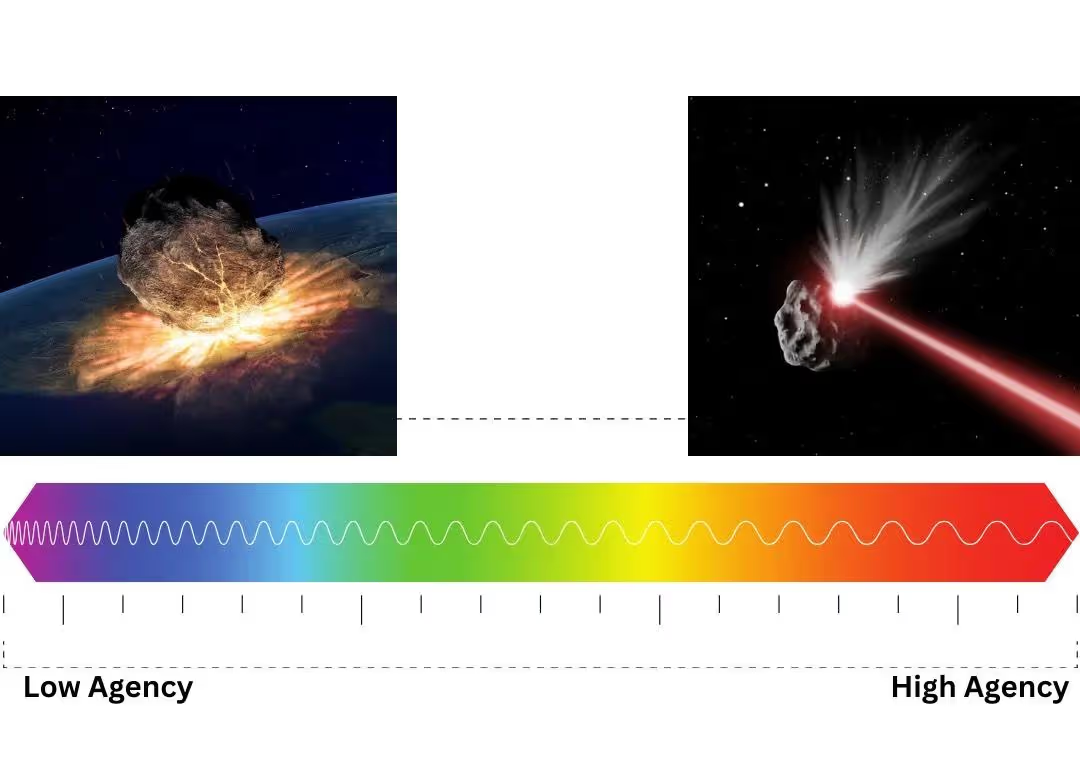
Even in outcomes that appear like pure luck — you can’t give fixed odds when there’s a human being involved. In 1961, Claude Shannon and Ed Thorp decided that hacking roulette didn’t defy the laws of physics. It was a solvable problem. They built the first-ever wearable computer to transmit information about roulette wheels. It was a cigarette packet-sized box that they placed in their shoe. Shannon and Thorp would use a toe-operating switch to input data on the ball’s speed and wheel rotation to predict a landing zone. They improved their odds by 44% and the device could outsmart the house.
2. There’s no way
In Tennis, there was a special moment in history: The 3 greatest of all time -- competed at the exact same time. Federer. Nadal. Djokovic.
Matthew Syed tells a wonderful story of watching them warm up before Wimbledon at Aorangi Park.

When Nadal warmed up, it was pure aggression. His biceps were bulging. He sprinted up and down like a man possessed. His shirt was dripping in sweat. When Djovocick warmed up, it was pure emotionless calibration. He was measured and scientific with every shot. When Federer warmed up, you could hear him giggling before he arrived. He's doing trick shots, caressing the ball and exploring his own creativity.
The beautiful lesson from this is that the 3 GOAT's existed at the exact same time... And had 3 unique approaches personalised to them.
There was no "right way" of doing things they all repeated. The irony is the only thing they all had in common was creating their own unique approach.
In a similar story, legendary musicians Leonard Cohen and Bob Dylan were sat in a cafe in Paris:

Bob Dylan asks Cohen: ”How long did it take you to write Hallelujah?”
“Oh you know a couple of years” - Cohen replied. (It was a lie — it took him 7 years but he wanted to play it down)
Cohen then asked Bob Dylan: “How long did it take you to write Like a Women?”
Dylan replied: “Fifteen minutes”
There is no way. Just agency.
3. There’s no “adults”
If you dig deep enough under low agency thinking, you often discover a belief in a god-like adult class that is superior to them. There’s a Peter Pan perception of reality that has been frozen in time from childhood. The fictional beliefs of Santa and the Toothy Fairy were debugged – but the belief in this flawless adult class that runs the world still remains.
Politicians, CEO’s, institutions, lecturers — there’s this mystical group of adults who have figured everything out. A world full of emperors – all wearing beautiful clothes.
In reality, nobody consented to being born, they started off as a sperm cell, fertilized an egg, came into this world screaming in a hospital bed with no sense of self, downloaded patterns of mimetic information from those around them, got jacked up on hormones — and now we call them “adults”. Deep down, these “adults” are figuring out reality each day one breath at a time — just like you. When you see behind the curtain of people’s lives, your brain rehumanises them. They are not perfect beings that have figured everything out. They eat, sleep, cry and visit the bathroom just like you.
The high agency individual looks around at the adults around them and sees naked emperors everywhere. Reality gives many aha moments if you look closely:
- Meet your heroes - If you meet your heroes (or read their biographies), you often realise Superman is just Clark Kent — but your mind’s perception was the movie studio putting this human on a god-like pedestal. Your heroes made countless mistakes, battle insecurities and have clear flaws. If that person had agency despite this — why can’t you?
- The Teacher Awakening - One of the biggest “Adults don’t exist” moments comes in your early 20’s. A person you know who has a messy life and is unsure of what they want to do with their life decides to become a teacher. You then do the mental maths: “What % of the teachers I outsourced my agency to growing up were also lost and confused?” The adults never existed.
- The Milestone Red Pill - When you’re 15 and meet someone who is 25, you think they are a different creature to you. You can’t imagine what it’s like to be 25 – but you’re convinced you’ll have everything figured out by the time you get there. You hit 25 – and realise the time has gone by in a blink of an eye, and you don’t feel much of a different creature to your past self. You then meet someone who is 35, 45, 55, 65 – and keep repeating the same fallacy. The magic adult badge of figuring everything out never gets posted to you. You have some experience, greyer hair and wrinkles – but you never transcended into the god-like adult class.
Humanize the "adults' around you. Biological adults exist — but these superhuman “adults” that run the world don’t. Don’t put anyone on a pedestal. Kill your gurus. A more useful belief: The “adults” aren’t going to save you — they don’t even exist.
4. There’s no memory of normal
A low agency trap: Optimising for normal low agency behaviour rather than weird high agency behaviour because we want people to like us.
The paradox: We use normal behaviour to be liked by the tribe — only for them to completely forget the behaviour. Nobody tells stories of when you did the expected normal behaviour. They only tell stories when you do the weird and unexpected. Normal behaviour costs nothing in the short term but disappears into the abyss. Unconventional behaviour costs a price in the short term — but the actions live on as story assets in the future.
- If you pay for the bill at everyone in the table - the short-term reaction is shock and confusion. In the long term, it’s everyone’s favourite memory of you.
- If you travel across the world for a friend's birthday, the friend’s initial reaction is: “You don’t have to do that” — but it’s the story they tell at your funeral.
- If you’re 100% honest with your feedback on people’s business ideas, the short-term reaction is anger. In the long term, you become one of the few people they trust.
If you study biographies or attend the funerals of people you care about — the normal rational behaviour is never mentioned. It’s filled with stories that make the individual unique. It’s all the times they broke out of the median distribution of human behaviour and displayed individual agency.
If you’re hiding your weird individualism to make the tribe like you, remember: They’ll soon forget everything you did or said. Normal behaviour is forgotten. Only weird behaviour survives.
Optimise for the eulogy, not the CV.
5. There’s only now
The past no longer exists — it’s just a memory appearing in the now. The future does not yet exist — it’s just a dream appearing in the now. Life is just a series of nows.
Tick tock. Tick tock. Hear the clock? Another now has just gone by. And another one.
Kevin Smith tells a story of his father who lived his life playing by the rules:
"My father was a good guy. Not many good men in the world, but this was a good guy. He worked at a post office, canceling your stamps - what a soul-killing, horrible job that is - for years, just to pay for a family. Who knew if he had dreams? Maybe his only dream was to get married and have kids. Maybe it wasn't a big deal to him, and he did whatever he had to do to put food on the table. I get a phone call at 6am from my brother. He tells me to get down to the hospital on Walnut Street… I get to the emergency room, open the door, and the first thing I see is my mother, who looks more scared than I've ever seen a human being in my life. There was terror on her face. I've seen my mother cry in my lifetime…This was different. This was like terror, fear, almost like there was a gun to her head. I looked to my brother, and he just had this expression where he gave me the slow nod, which meant my father was gone.
Then my brother says something that probably defined my life: "He died screaming."
I couldn't believe it. I asked if it was a figure of speech, and he said no, he literally died screaming. You could see my brother was haunted by it. My father wasn't a soft man by any stretch of the imagination, and I'd never heard him get really loud. The notion of my father dying screaming changed my life. I realized that even a good man in this world, who played the game straight, played by the rules, did everything he was supposed to do, could end up dying screaming. At that point, I decided there's no point in not trying to accomplish every stupid dream I've got, even if it's dumb stuff….Chase it all and do it all because we're all going to die screaming, and you might as well enjoy it here.
There’s no guarantee of the future. There’s not even a guarantee you won’t die screaming. There’s only now.
5. Agency Over Your Agency
Here’s a list of practical ways to have agency over your agency — to crank yourself up the high agency spectrum and become the type of person a friend would call when stuck in the 3rd world jail cell:
1. High Agency Flow Chart
Does your problem defy the laws of physics? No.
Have I escaped all low agency prisons?
• Midwit prison —> What would the guy on the left do?
• Vague prison —> How can I crank up the specificity dial more? Transform all thoughts out of your head?
• Attachment prison —> What would I do If I had 10x the agency? How would I advise a friend in this situation? Can you bulk upload previous moments?
• Rumination prison —> How can I turn this into an experiment?
• Overwhelm prison —> What’s the smallest first step imaginable? Can I structure the small steps in an order like a fun video game?
Bias for action:
• How can I take action on this now? How can I execute on the smallest first step?
• What action can I take makes all future action easier?
2. Turning bullshit into reality
Regularly practice turning bullshit into reality with this simple exercise:
Step 1 - Write down esoteric things you value. E.g. Value 1 - Gratitude.
Step 2 - Write down 5 specific ways you can display that vague value in reality with specific action. Don’t think. Just dump.Step 3 - Pick the one that gives you the strongest sense of fear. E.g. Write the thank you letter to teacher who stopped me being bullied when I was 15 years old.
Step 4 - Write down every micro step you need to take.
• Find the teachers email
• Write the letter
• Hit send
Step 5 - Do each step now.
Step 6 - Feel the emotion of being a live player. The goosebumps on your arms, the tears running down your face, the dry mouth. Those are high agency side effects: You’re alive.
Step 7 - Come back tomorrow and repeat. Keep stacking evidence of turning bullshit into reality. You’re an action machine
3. How To Spot High Agency People
The easiest way to move up the high agency spectrum: Find high agency people and spend time with them. One bug of low agency is outsourcing your worldview to other people. This bug can be turned into a feature by spending time around high agency independent thinkers who make you question your worldview.
Here’s some traits to look out for:
1. Weird Teenage Hobbies - Teenage years are the hardest time to go against social pressures. If they can go against the crowd as a teenager, they can go against the crowd as an adult.
2. Treadmill energy - If you meet with them when you're tired and defeated, you leave the room ready to run a marathon on a treadmill with max incline.
3. You can never guess their opinion - The boxer who writes poetry. The advertiser obsessed with the history of war. The beauty queen who reads Nietzsche. If their beliefs don't line up with their stereotypes, they've exercised agency.
4. Immigrant mentality - If they've moved from their hometown, that's a good sign. If they've moved from their home country, that's an even greater sign. It takes agency to spot you're in the wrong place, resourcefulness to operationalize a move and a growth mindset to start from zero in a new location.
5. Sends you niche content - Low agency people look at the social engagement of content before deeming its quality. High agency people just look at the content. They spot upcoming trends very early.
6. Mean to your face, nice behind your back - The social incentives are to be nice to people's faces and gossip behind their backs. To do the opposite requires agency because they're swimming against the social tide.
7. Quit something of prestige - The miserable management consultant who breaks out of their golden handcuffs to become a stand up comedian has to overcome momentum, social shame and sunk cost fallacy. The high agency person lives many lives and isn’t afraid to reinvent themselves — regardless of the perceived social cost.
8. They don’t trust. They verify - A low agency trap is to be hypnotized by groupthink. High agency people refuse to passively download the current thing without first verifying it for themselves:
• “They say” —> Who is they?
• ”Science says” —> What is the science? Can I see the primary sources?
• ”Misinformation —> What is your theory of knowledge? Can you show me the first principles?
9. Self-taught learning machines - Whether it’s learning to play their favourite song on the Saxophone or deconstructing how 3D printers work — they start from zero and use agency to climb up the knowledge ladder. Tesla, Da Vinci and Darwin didn’t ask for permission from institutions to just do things.
10. They question the question - Before rushing to answer your question, they question whether it’s the right question to answer. They know the right answer to the wrong question is worse than no answer to the right question.
If stuck between two potential options, ask: What is the best story?
”Life is a form of self storytelling. We're continually retelling ourselves our life story, but very few people think of themselves as authors of their story, not mere subjects. People with extraordinary high-agency realize this early in life and start maximizing the interestingness of their life story.
Having a fascinating life story is not just an exercise in vanity -- it has a real impact on your success in life. You'll have an easier time attracting friends as well as life and business partners. It'll also make it much easier to sell yourself or your products. It has a kind of compounding halo effect…
So next time you're faced with a tough decision, consider the path that makes a more interesting story. If it turned out to be the wrong decision to have made, you'd at least be fun at dinner parties.” - Amjad Masad
Do it for the plot. And most importantly — don’t go back to the carpet store.
5. The Swedish House Mafia Technique
Step 1 - Collect the smartest people you know.
Step 2 - Tell them about your 3rd world jail cell.
Step 3 - Lock the door. Block out the outside world.
Step 4 - Keep throwing ideas back and forth like a tennis rally. Take immediate action on the best ideas.
It will look like this:
6. A Change Of Perspective Is Worth 50 IQ Points
A wealthy businessman walks into a Swiss bank in Geneva and requests a loan of $1000.
When asked for collateral for the loan, he generously offers his luxury Mercedes, which is seemingly too good for collateral for this amount. The bank manager quickly approves the loan.

After a year, the businessman returns to the bank and pays the principal of $1000 and an interest of 10%. He then asks the bank to hand his car over. Puzzled by this entire transaction, the bank manager cannot hold himself back further and asks the businessman what his urgency was to get just $1000.
He readily left his luxury vehicle with the bank for a whole year. The businessman replied that there was no such urgency, but he simply could not think of a better long parking solution for his Mercedes in Geneva, charging only $100 for the entire year.
Some questions to get a different perspective:
A. Derek Sivers mentor technique: ”I have three mentors. When I’m stuck on a problem and need their help, I take the time to write a good description of my dilemma, before reaching out to them. I summarize the context, the problem, my options, and my thoughts on each. I make it as succinct as possible so as not to waste their time. Before sending it, I try to predict what they’ll say. Then I go back and update what I wrote to address these obvious points in advance. Finally, I try again to predict what they’ll say to this, based on what they’ve said in the past and what I know of their philosophy. Then, after this whole process, I realize I don’t need to bother them because the answer is now clear… None of them know they are my mentors.”
B. If I had an evil twin who’s job was to think more creatively about this problem than I am, how would he go about approaching this problem?
C. // Needs one more
7. If you had a gun to your head and had to make it possible, what would you do?
A 20 year old truck driver wanted to become a film maker. But he had 2 problems:
1. He couldn’t afford film school
2. He was a truck driver
When done with his trucking shift, he'd go to USC library, which was the film school he couldn’t afford. He’d find the dissertations of people taking the programme, pull the staples out and photocopy the 300 pages. The truck driver did the same thing week after week for 6 months, and would teach himself film making whilst driving his truck.
”I was going through this stuff, chapter and verse, and making my own notes and all that. I basically gave myself a college education in visual effects and cinematography while I was driving a truck.”
He gave himself a graduate course in film from the top school in the country — by using the photocopying machine. This truck driver was James Cameron, who is now the 2nd highest grossing movie director of all time — behind films like Titanic and Avatar.
If you had a gun to your head and had to make it possible, what would you do?
8. How To Become More Disagreeble
It isn’t enough to be a resourceful creative thinking machine with a high bias to action. As you turn up the high agency dial in life, the environment around you will disagree with you. You have to crank up your disagreeability. Here’s some ways to train this muscle:
- Kill Your Gurus - Who is your favourite thinker, author, podcaster or guru? Can you identify clear things you disagree with them on? Or are you just passively downloading what they say?
Kick the pedestal from underneath them. Kill your gurus. Remember: The adults don’t exist. - Steelman your enemies - Who do you dislike the most? What is the best representation of their opinion?
- Stop waiting for the news - When did the Roman Empire fall? Answer: 476 AD. Harder question: When did Roman society recognise the Roman Empire had fallen? Answer: For most Roman people, it wasn’t acknowledged that it had fallen until centuries later. High agency question to explore: What is ignored or neglected by the media — that will be studied by historians?
One common trait that high agency people share is: Don’t wait for the news. They work from first principles, craft their own information sources and make moves before the consensus agrees they are right.
This doesn’t just apply to the macro — it also applies to the micro. Don’t wait for a friend to tell you to get that mole checked — it’s too late. Don’t wait for your boss to call you in to his office — it’s too late. Don’t wait for your partner to text you “Can we talk?” — it’s too late. Don’t wait for the government to tell you about inflation— by then, it’s too late. If you wait for the news to inform you — you’ll be wrong and then late. - The difficult conversation event
Step 1 - Write down all the difficult conversations you’ve been putting off.
Step 2 - Pick one. Do it now.
Step 3 - Feel your brain update your self-identity around conflict.
Step 4 - Come back same time next week.
9. Parkinsons Law, Parksinsons Law Everywhere
SpaceX needed specific export licenses to proceed with rocket development. Government officials claimed it would take 6-8 months to process the paperwork. Standard procedure. No exceptions. Most companies would have accepted this timeline. Instead, Elon dispatched an employee with explicit instructions: Drive to Sacramento, get to the licensing office the moment it opens, and don't leave until the papers are signed. The employee arrived at the office early morning. When told to schedule a return visit, he refused to move. Hour after hour, he stayed in the waiting room. Officials tried to explain procedures, suggested proper channels, but he remained unmoved. His only response: "I've been instructed not to leave until these are signed.” By late afternoon, faced with this unmovable presence, officials finally relented.
If someone says EOY, ask for EOM.
If someone says EOM, ask for EOW.
If someone says EOW, ask for EOD.
If someone says EOD, ask for now.
Gas shrinks to the size of the container.
10. Action Capex > Action Opex
Capex = Capital Expenditure — one-off investment that pays future dividends. A pizza machine that drops future costs by 50%.
Opex = Operating Expenditure — recurring investment. The ingredients for pizza.,
What this fancy business speak means is what action can you take that makes all future action easier?
One low agency trap to get stuck into is to invest in action opex without realising the bill is going to come everyday again. Instead, explore investing in action capex — an action that reduces all future investments.
Action capex examples:
A. Burning the boats.
// Still needs finishing here.